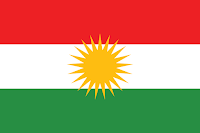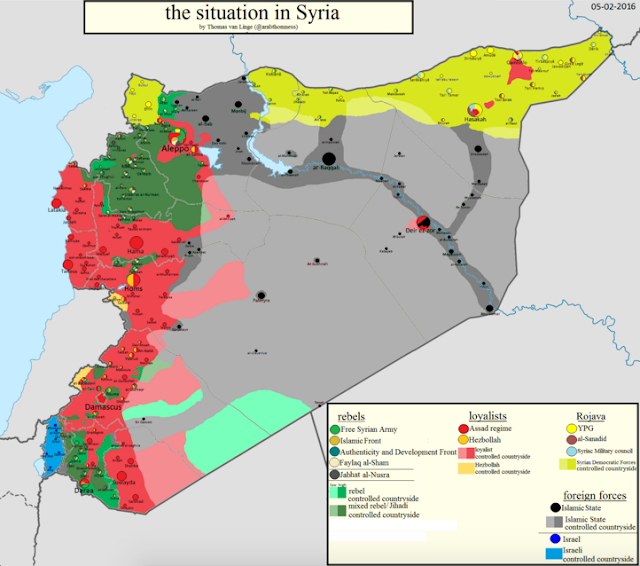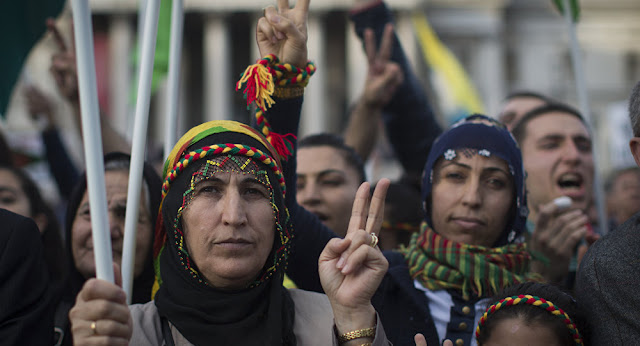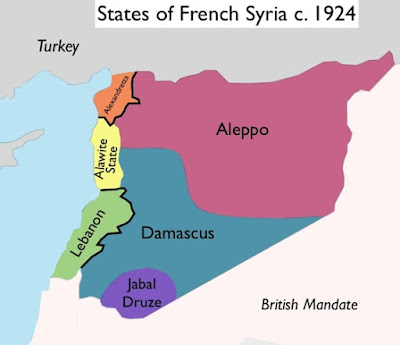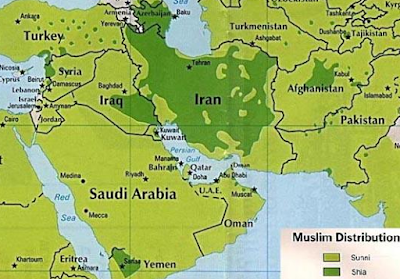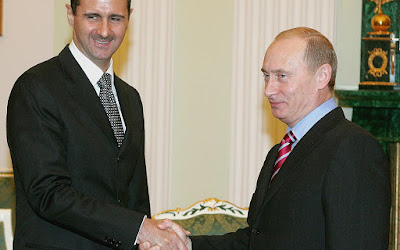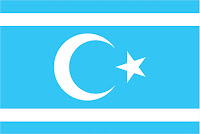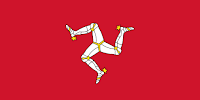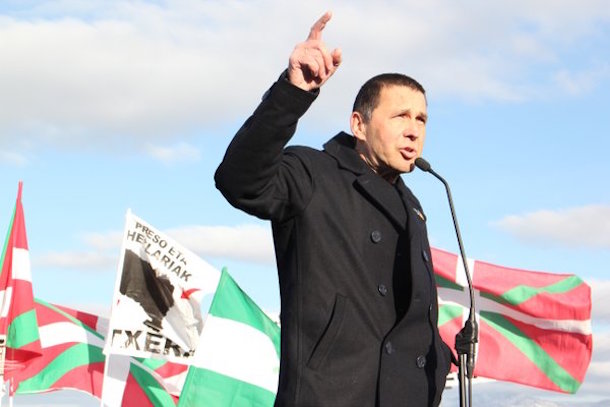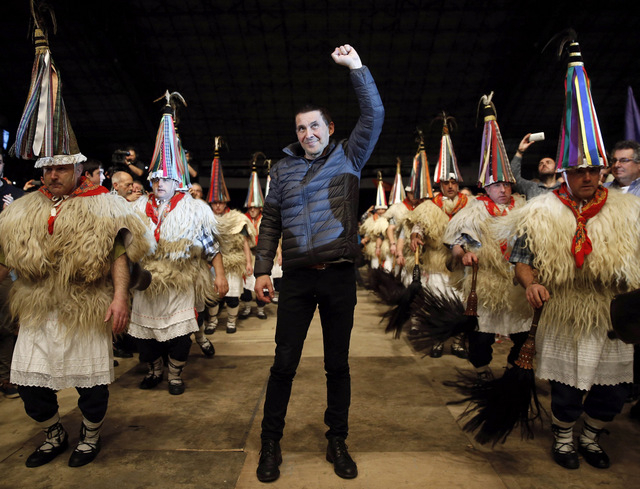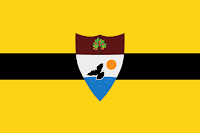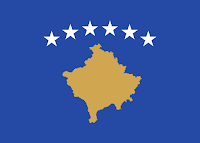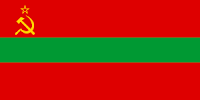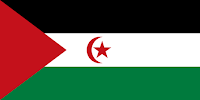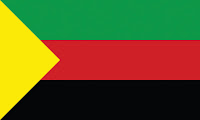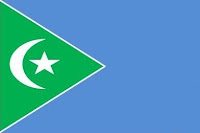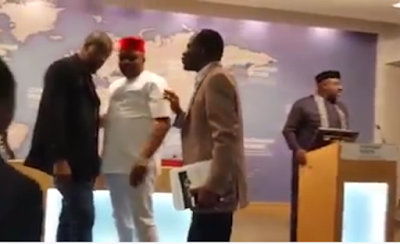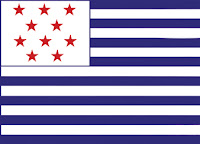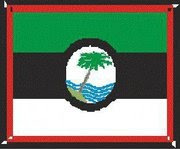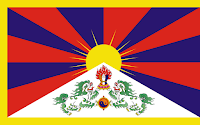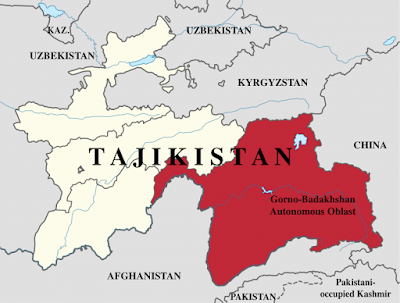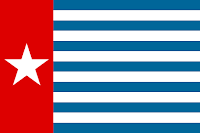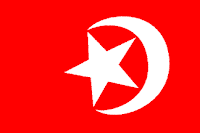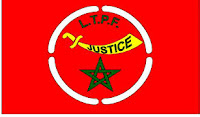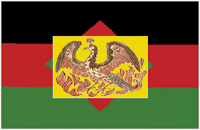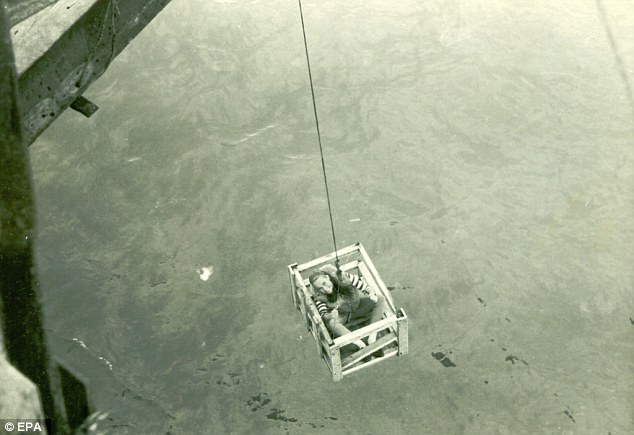TOP STORY:
PUTIN SUDDENLY DECLARES DRAW-DOWN FROM SYRIAN CIVIL WAR
AS INTERNATIONAL COMMUNITY OPENLY CONTEMPLATES PARTITION;
KURDS TILTING TOWARD RUSSIAN–ALAWITE AXIS, AWAY FROM WEST,
WHILE TURKISH WAR ON KURDISH MINORITY INTENSIFIES
The Russian Federation, which entered the already complex civil war in Syria last year, announced abruptly on March 14th that it was withdrawing the greater part of its military presence there, stating that its main objectives had been achieved. As I’m writing this, analysts are still trying to make sense of the move. Some think it is a ploy, designed to test international opinion on Russia’s role in the conflict. Others think the draw-down will be not necessarily strategically substantive but instead a way to create a “mission accomplished” moment that can open the door to the important next phase: partitioning Syria, with the dictator Bashar al-Assad’s Alawite (Shiite) maintaining a rump state in the western part of the country, where Russia has its military bases. (See my recent article from this blog, in which an Alawite State is no. 2 out of “Ten Separatist Movements to Watch in 2016.”) What is still unclear is what role the Kurds play in all this, as Kurdish strategy tilts ever more in the direction of aligning with Russia.
Even before the Russian announcement, the president of northern Iraq’s self-governing Kurdistan Region, Massoud Barzani, chimed in on March 3rd in support of converting Syria to a federation of different ethnic and sectarian regions—as opposed to what many fellow Kurds in northern Syria prefer, which is a separate state, or something very close to it, called Rojava. “We ask the Kurdish groups in Syria,” a statement from Barzani’s office read, “to have one position and in a united political project demand a federal system in Syria.” Here it is important to note that Syrian and Iraqi Kurds are very far apart politically. Iraqi Kurds are strongly aligned with the United States, the West, Israel, and even to some extent with Turkey, while the Syrian-Kurdish Democratic Union Party (P.Y.D.) is closely linked to the armed Kurdistan Worker’s Party (P.K.K.) insurgency currently waging war to the north against the Turkish state from within. (See my recent article from this blog, in which Kurdistan is no. 1 out of “Ten Separatist Movements to Watch in 2016.”)
A federal Syria could be divided into Kurdish, Alawite, Sunni Arab, and maybe Christian and Druze statelets, which is roughly the way it was subdivided when it was a colony of France between the world wars. Some kind of partition has become more likely since Russia’s entry into the Syrian civil war last year in support of keeping Assad, an uneasy sometime ally of the Kurds, in power. The P.Y.D.’s umbrella group, Tevdem, also supports Syrian federalism. Meanwhile, in an article this month for Foreign Policy, James Stavridis, a former North Atlantic Treaty Organization (NATO) supreme commander for Europe, echoed hints dropped last month by the U.S. secretary of state, John Kerry, to the effect that a full partition of Syria à laYugoslavia is probably inevitable. Such a break-up, he wrote, “would probably include an Alawite region around Damascus, running to the sea, ruled by the Assad regime or its follow-on leaders. It would also have a central portion that hopefully over time would be run by a moderate Sunni regime, obviously after subduing the Islamic State and various al Qaeda factions. Finally, and most controversially, it might include a Kurdish enclave in the east. Obviously, the approach for a partition could range from a full break-up of the country (much as Yugoslavia broke up after the death of Marshal Josip Tito); to a very federated system like Bosnia after the Dayton Accords; to a weak but somewhat federated model like Iraq.” (Stavridis says “a Kurdish enclave in the east”; more accurately, Kurdish lands are a strip running nearly the whole length of the border with Turkey; clearly, Stavridis doesn’t want them to have a coastal foothold.)
In the days before the announcement of their draw-down, the Kremlin condemned suggestions of a full partition in a forceful statement, but this may be a rhetorical feint on Russia’s part, since Russian strategy on the ground since their entry into the war had been very much to expand Alawite territory at the expense of the Free Syrian Army (F.S.A.) and other moderate rebels supported by the United States and NATO. A separate Alawite State seemed to be what they were laying the groundwork for—and, as I pointed out in this blog at the end of last year—this fit neatly into President Vladimir Putin’s primary interventionist strategy, which is to create quasi-independent, if diplomatically unrecognized, puppet states within otherwise hostile nations. Other examples are Abkhazia and South Ossetia within Georgia, Nagorno-Karabakh within Azerbaijan, Transnistria within Moldova, and the Donetsk and Luhansk“people’s republics” in eastern Ukraine. Could an Alawite Republic—perhaps nestled on the east end of an otherwise Western-aligned Sunni Arab state—be the newest member of this archipelago of Russian satellite statelets?
An Alawite State would serve another geopolitical function as well: it would preserve the arc of Shiite-dominated territories aligned with Russia stretching from the Caspian Sea to the Mediterranean: Iran, Iraq (a majority-Shiite country which, after the U.S.’s removal of the Sunni Arab dictator Saddam Hussein in 2003, became (aside from its Kurdish north) Shiite-ruled—and has increasingly become allied with Russia’s ally Iran), Syria, and the Hezbollah-ruled parts of Lebanon. With a swath of land like that, Putin and Iran together could exert so much control over the energy that reaches Europe that they would be able to dictate political terms to the West—and, not incidentally, to Turkey and Saudi Arabia as well.
But there’s one problem with that arc of land: Shiite-ruled Iraq and the Alawite part of Syria are, for the moment at least, separated by parts of Syria ruled by not only Rojava Kurds but by the radical-Sunni-Arab Islamic State of Iraq and al-Sham (ISIS), a.k.a. the Islamic State (which also includes adjacent areas of Iraq). Thus, over the past few weeks, Russia has been working more and more closely with Kurds in fighting ISIS. (Just this month, Peshmerga (Iraqi Kurdish military) sources reported that they had battled ISIS forces just west of Mosul, Iraq, on March 3rd, with coalition air support, and killed more than 100 militants. A Peshmerga commander, Majid Sindi, said the battle prevented I.S. from capturing “the territories of Talafar, Kaske and the Mosul dam.” Forces from the Iraqi Kurdish Peshmerga in league with Nineveh province’s Shingal Protection Units (Y.B.S.) stormed an Islamic State prison camp near the Syrian-Iraqi border on March 4th and freed 31 Yezidis that had been captured more than a year ago. Just south of Kirkuk, on March 12th, Peshmerga forces managed to foil an ISIS suicide attack, according to a Peshmerga commander. Six suicide bombers died in the attempt.)
Partly, this new pro-Kurdish strategy of Russia’s is because Moscow has already succeeded in consolidating Assad’s control of western Syria, including its whole coast. And partly it is a way of creating fresh memories of Russia battling ISIS at the end of its involvement in Syria, hoping the international community will forget that 80% of its resources were committed to fighting moderate Sunnis on behalf of Assad. (There are few strategic areas where Assad-held territory abuts ISIS-held territory; mostly, it is Kurds on the front lines against ISIS.) But partly Russia’s new relationship with the Kurds can be laid to a Russian desire to take advantage of the fact that Syrian Kurds are isolated and shunned by Turkey, by the Iraqi Kurds, and by the West. The Kurdish survival strategy has always been: take any ally you can. And it is notable that in the long Syrian civil war Kurds and Alawites have rarely fought each other directly. Kurds were first able to consolidate control over Rojava because Assad, back in 2012 and 2013, was withdrawing from the Kurdish areas in the north and allowing Kurds to set up their statelet; this provided Assad with a buffer zone between himself and his enemy Turkey, and it enabled him to buy some loyalty from the Kurds that could be used later in a battle for survival against Syria’s Sunni Arab majority. (Kurds are not Arabs. They are mostly moderate Sunni Muslims, but some are Shiites, especially in Turkey and Iran—not so much in Syria and Iraq.)
Assad’s foreign minister even on March 12th lauded the vigilance of the country’s Kurdish population in combatting “the common threat” of ISIS. “Kurds are citizens of Syria,” said the minister, Walid Muaalim (conveniently forgetting that, until the Arab Spring, Assad had denied them citizenship rights), “and we are in the same ditch together against ISIS as we try to rebuild the country.” There are also signs of this new realignment in Iraqi Kurdistan. The Russian ambassador met with Barzani on March 13th, with offers of military aid to the Peshmerga in the fight against ISIS. In another indication of this dynamic, Barzani’s Kurdistan Regional Government (K.R.G.) recently described the actions of Turkey’s military to the north in its civil war as “genocide” against Kurds—a shift toward Russian-style Turcophobic talking-points and away from a years-long, but recently fraying, détente between Iraqi Kurdistan and Turkey (mostly over shared energy interests). That détente notable began unraveling as the Kurdish cease-fire within Turkey broke down in July 2015.
So: could Putin be contemplating a pro-Kremlin Syrian Kurdish puppet state as well? It would have some logic to it: during the Cold War, the P.K.K. was explicitly Communist (it isn’t so much anymore) and backed by the Soviet Union—in order to undermine both Turkey, a NATO member, and Iran, which during most of the Cold War was, under the Shahs, aligned with the West. This would create a painful and possibly explosive situation of two independent or autonomous Kurdistans side by side on different sides of the deepest modern geopolitical division, between Russia and the West.
The emergence of a strongly pro-Russian Kurdish entity within Syria would have two devastating effects on Kurdish aspirations elsewhere. First, it could seriously, or even permanently, delay Iraqi Kurdistan’s aspirations for independence—especially if Russia continues to cajole, bribe, and bully Barzani toward the pro-Kremlin camp (see above). Secondly, a stable, pro-Russian Rojava statelet would make Turkey even more paranoid about its own Kurds and would provide the pretext for a renewed assault on the Kurdish population. Sadly, this would be something the West would not complain about very much on human-rights grounds: just this month, Turkey signed an important protocol with the European Union (E.U.), promising to restrict the flow of refugees from the Syrian (and Libyan and Yemeni) through its territory toward Europe, in exchange for a host of political favors from the E.U.—explicitly including putting Turkey back in the queue for E.U. membership (don’t worry; they’ll never qualify; this is mainly a trophy that President Recep Tayyip Erdoğan can display for internal political purposes), and implicitly including the E.U. and NATO turning a blind eye to Turkish human-rights violations, which are nearly as bad as Syria’s, to be honest.
In fact, since the refugee crisis has made Turkey so politically valuable to the survival of E.U. governments, individually and collectively, it is even possible that Turkey could point to, or manufacture, some sort of cross-border provocation by Syrian Kurds to invoke the NATO charter’s Article 5, which states that an attack on one member-state is an attack on all (last invoked following September 11, 2001). That could create a full-blown regional war with Turkey, Saudi Arabia, Israel, and NATO on one side and Russia, Iran, Rojava, Alawite Syria, and Shiite Iraq on the other—and ISIS taking advantage of everyone else’s distraction to re-expand.
But these are all speculations. For now, we can be distressed enough that in the perhaps inevitable process of partitioning Syria, Vladimir Putin will have a seat at the table. In addition to a pro-Russian Alawite rump state right on the Mediterranean, with permanent Russian naval and air bases—a geopolitical prize that centuries of Czars could only have dreamt of—we may also see the emergence of a Kurdish nation seduced by the Kremlin and divided against itself.
OTHER UPDATES FROM SYRIA
ISIS’s Notorious “Omar the Chechen” Dies from Injuries in U.S. Airstrike. The Syrian Observatory for Human Rights (S.O.H.R.) reported on March 15th that one of Syria’s top Islamic State (a.k.a. ISIS) commanders, known as “Omar the Chechen,” had died from injuries sustained in a United States airstrike on March 4th. The strike, which was on a training camp near Shaddadi, Syria, was targeting the commander, whose real name was Omar al-Shishani. Initially, on March 10th, the S.O.H.R. said that Omar had survived the attack and been transferred to nearby Raqqa, the de facto capital of ISIS-occupied Syria, for medical treatment. In an update on the 13th, the S.O.H.R. said Omar was “not able to breathe on his own and is using machines. He has been clinically dead for several days.” Shishani was born in the Republic of Georgia’s Pankisi Gorge region as an ethnic Kist (Chechen) with the name Tarkhan Tayumurazovich Batirashvili, and had served as ISIS minister of war—a recognizable figure because of his distinctive red beard.
 |
| Omar the Chechen—presumably enjoying his 72 virgins in Paradise right now |
Israeli Ambassador to U.S. Openly Backs Independence for Iraqi Kurdistan. The Israeli ambassador to the United States came out strongly in favor of independence for Iraq’s northern Kurdistan Region, according to comments by him leaked to the media on March 4th. The ambassador, Ron Dermer, compared the Kurdish independence struggle to Israel’s, saying, “Israel is backing the Kurds in their struggle for independence and praising their efforst in the war against ISIS. ... We feel there are strong relations between Jews and Kurds and between Israel and Kurdistan.”
Iraqi Turkmens Return to the Center of Battle, with Chemical Weapons in Play. On March 5th, security forces from northern Iraq’s Kurdistan Regional Government (K.R.G.) moved into Tuz Khurmato, a mixed-population town in historical Kurdistan which lies outside the official Kurdistan Region, to try to quell conflict between Kurds and a Shiite Arab militia called Hashd al-Shaabi. The town, in Saladin province, has often been suggested as the center of an autonomous region for Iraq’s Turkmen minority, who are mostly Shiite but are not Arabs. The Iraqi central government said this month that official investigators had found evidence of mustard gas, a banned chemical, having been used by the Islamic State of Iraq and al-Sham (ISIS, a.k.a. Islamic State) in Taza, a town in Kirkuk province dominated by Turkmens. A reported 600 civilians have been wounded in the associated attacks in Taza recently.
Vatican Envoy Asks Barzani to Focus Peshmerga on Liberating Christian Villages. The Kurdistan Region’s president, Massoud Barzani, met with Vatican City’s ambassador to Iraq in Erbil, the Iraqi Kurdish capital, on March 5th, and vowed to liberate all Kurdish areas currently under the control of the Islamic State terrorist group (a.k.a. ISIS). The ambassador, Alberto Ortega Martín, made a special appeal for the Kurdish military, the Peshmerga, to liberate Christian villages under ISIS control—many of which are in areas defined as Kurdistan.
Advocates for Iraq Assyrian Paramilitaries Register to Lobby in Washington. An Illinois-based diaspora advocacy group for Assyrians from Iraq has registered as an official lobbying organization in Washington, D.C. The organization, called the Nineveh Plain Defense Fund, represents the Assyrian Democratic Movement political party and the paramilitary Nineveh Plain Protection Units. The Nineveh Plain, in Iraq’s Nineveh province, has often been cited as a spot for a likely eventual Assyrian autonomous region within Iraq—or within an independent Kurdistan, depending on where its borders end up being drawn. The purpose of the group is to support “policies that would provide financial, logistical, humanitarian, and economic development support directly to the indigenous ethnoreligious minorities of the Nineveh Plains of Iraq and their non-governmental organizations.”
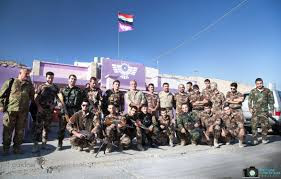 |
| Nineveh Plain Protection Units: now they have a voice on K Street |
OTHER UPDATES FROM TURKISH KURDISTAN
Hundreds Die in Turkey’s Kurdish Civil War amid 3rd Car-Bombing in Ankara. Fighting continued between Turkey’s military and the southeastern Kurdish minority this month, with the third car-bomb in five months killing at least 37 people in Ankara, the Turkish capital, on March 13th, an attack Turkey blames on the banned militant Kurdistan Worker’s Party (P.K.K.). The car-bomb was adjacent to a city park and crowded bus stops, indicating it was not an act of the mainstream P.K.K., which mainly focuses on military and police targets. Eleven suspects have been arrested, according to the Turkish government, which also named the female suicide bomber who supposedly carried out the mission. Despite the ambiguities, Ankara used the attack as a pretext for renewed bombing raids on P.K.K. positions over the border in northern Iraq’s Kurdistan Region the next day and for imposing 24-hour curfews on two Kurdish border towns—Yuksekova, near Iran’s border, and Nusaybin, near Syria’s—in apparent preparation for a full assault. (Already, on March 12th, the Turkish government had said it had bombarded P.K.K. positions in northern Iraq over previous days, killing 67 rebels.) In other developments in the civil war, the Turkish military announced on March 1st that five P.K.K. fighters had been killed the previous day in battles in Şırnak province’s İdil district and the Sur district of Diyarbakır. Three Turkish officers were injured in the İdil fighting. On March 2nd, the curfew in Cizre, in Şırnak, was formally revoked for daylight hours but remained in force during nights. Residents returned to find the city virtually demolished. In Istanbul on March 3rd, two females arrived by taxi to attack a police station with grenades and firearms. Police pursued the retreating women, surrounded them inside a building, and killed them. Two police were injured in the incident. No group claimed responsibility. Russian and Kurdish media reported on March 3rd that P.K.K. fighters had shot down a Turkish military helicopter over Iraqi Kurdistan during a Turkish bombing sortie. A car bomb at a police station in Nusaybin, in southeast Turkey’s Mardin province, killed two police officers and wounded 35 people on March 4th. Turkey blamed the P.K.K. for that bombing. On March 7th, the Turkish military said 13 P.K.K. fighters had been killed over the course of a two-day-long firefight during a firefight in İdil. One Turkish soldier was killed in İdil and another in Sur, where 10 P.K.K. fighters also died. A spokesman for the Kurdish People’s Democratic Party said that Turkish forces had killed 137 Kurds in Cizre during the first week of March. On March 10th, seven P.K.K. militants were reported killed in Sur during clashes with the military.
 |
| Kurds returning after the lifting of a curfew to find their homes destroyed |
Shiite Mob Vandalizes Yarsan Holy Site in Iranian Kurdistan. A holy site of the Yarsani (a.k.a. Ahl-e-Haqq) religious minority in Iran’s Kurdish-dominated Kermanshah province was attacked by a mob on March 6th, after the government denied a Yarsani group a permit for a peaceful protest. The attackers were over 100 Iranians claiming to be followers of Ali Khamenei, Iran’s supreme ruler, and they proceeded to vandalize the temple, which is in the town of Shah Abad. There are over 1 million followers of Yarsanism in Iran, most of them Kurds, but the Shiite theocracy has labeled them a “false cult.” There are also Yarsanis in Iraq and Turkey. The Shah Abad attack was condemned by leaders of the Kurdish minority, who are more numerous in Kermanshah and who accuse the government of being behind the violence.
EUROPE
New “RISE” Coalition’s Harder Line on Independence Challenges Scottish National Party. A new far-left political party in Scotland has vowed to make a second independence referendum its priority. The coalition—called the RISE–Scotland’s Left Alliance (RISE stands for “Respect, Independence, Socialism, and Environmentalism”)—was formed this year and is designed to break the grip of Scotland’s ruling Scottish National Party (S.N.P.).
 |
| Cat Boyd (shown here with raised fist and Cuban flag) ... |
 |
| ... is the young, hip, edgy face of the RISE–Scotland’s Left Alliance. |
As June Vote Nears, Isle of Man Mulls Scenarios for Staying in E.U. Post-“Brexit.” The government of the Isle of Man, a fully self-governing Crown Dependency of the United Kingdom which uses Queen Elizabeth II as its head of state (the British crown conferring with it the title Lord of Mann), is trying to come to grips with its own stake in the referendum scheduled for this June on whether the U.K. will leave the European Union (E.U.). The Manx chief minister, Allan Bell, addressed the House of Keys, the lower house of the Manx Tynwald, or parliament, this month, pointing out some fine wrinkles that could complicate the status of Man in case of “Brexit.” An E.U. statute called Protocol 3 defines Manx membership in the E.U. Customs Union, along with six other non-E.U. states: the British Crown Dependencies of Jersey and Guernsey, Turkey, Andorra, Monaco, and San Marino. These states enjoy free trade but not other benefits like the right to relocate and work. If the U.K. withdrew from the E.U., Man would have to renegotiate its membership in the Customs Union. Kate Beecroft, who heads Man’s pro-autonomy Liberal Vannin Party, raised the question of whether Manx should hold their own referendum on whether to seek separate membership in the E.U.—which might or might not involve seceding from the U.K. Bell refused to countenance the question, emphasizing that Man would try to be part of any post-Brexit attempts to negotiate free-trade unions with the E.U., but he also admitted that no one quite knew what a Brexit would mean for the island.
Joan, Dowager Princess of Sealand, Dies in England at Age 86. Mrs. Joan Bates, who was known within her minuscule Principality of Sealand and around the world as Her Royal Highness Princess Joan, died this month at a nursing home in Leigh-on-Sease, Essex, England, at the age of 86. Technically, she was dowager princess, her husband, Roy Bates, a.k.a. Prince Roy, having died in 2012 at the age of 91. Sealand began as the H. M. Fort Roughs, an abandoned Second World War floating pontoon fort in the North Sea off the coast of Essex, which became a pirate radio station in the 1960s. Being a built structure, it does not qualify under international law as territory, and thus cannot be a state, but after British Marines intervened in a power struggle at the small pirate radio station in 1967, a United Kingdom court declared that it was outside of territorial waters and therefore not in U.K. jurisdiction. This gave the Bateses the idea of declaring it a principality, on September 2, 1967, Joan’s birthday, and on that day they became prince and princess.
In 1987, the U.K. extended its marine boundary to 10, rather than three, miles from shore, so Sealand now is in British waters, but the U.K. government has left it alone. Sealand issues postage stamps and currency and hosts computer servers, and its thousands of citizens, some with purchased titles of nobility, live around the world, but none of them actually on Sealand. Sealand has no diplomatic recognition, except from other “micronations”—a concept that Roy and Joan Bates can take most of the credit for introducing to the 20th century. The current reigning prince is Roy and Joan’s son Prince Michael, age 63, who remembered the late dowager princess this way: “My mother was a natural beauty who devoted her life to her husband. A former carnival queen and model, Joan led quite a high profile life alongside my father. She became engulfed by the offshore pirate radio phenomena, helping to establish Radio Essex. She did a lot for charity throughout her life, particularly the R.N.L.I. [Royal National Lifeboat Institution]. ... My mother was a stunning woman.”
 |
| The face that launched a thousand micronations |
Basque Prisoner Arnaldo Otegi Released to Cheering Crowds, Vows Independence. A Basque independence advocate greeted 200 joyous well-wishers upon his release from a Spanish prison in Logroño, in northern Spain, on March 1st after serving a six-year sentence. The separatist, 57-year-old Arnaldo Otegi, had been convicted of trying to restart the banned political party Batasuna, considered the political wing of the separatist militia Basque Homeland and Freedom (Euskadi Ta Askatasuna, or ETA). At his release, he spoke of his commitment to non-violence, while crowds chanted, “Independence! Independence!” “Some say there are no political prisoners in the Spanish state,” he said, “but there would not be so many media here today if it wasn’t for the fact that today a political prisoner left a Spanish jail. Peace is the path to follow and it is what I propose to do with you.”
Four days after his release, he electrified a crowd of over 10,000 at the velodrome in San Sebastián, telling them that the Basque Country would become independent from Spain and that Catalonia was leading the way. In 2013, while in prison, Otegi was made secretary general of the legal, mainstream pro-independence party Sortu, and he says he intends to lead the Basque Country eventually, though the terms of his conviction ban him from public office until 2021.
French Activists Petition to Rename Amalgamated Administrative Region “Occitania.” So far over 14,000 have signed a petition to attach the name Occitanie (Occitania) to a new région (administrative region) of France that came into being on January 1st of this year along with the reorganization of several of France’s région names and boundaries. For the moment, the région, which resulted from the merger of Languedoc-Rousillon and Midi-Pyrénées, is being provisionally referred to as Languedoc-Roussillon–Midi-Pyrénées.
Italian Court Strikes Down Lombard “Anti-Mosque” Law Backed by Lega Nord. A constitutional court in Italyhas struck down, with near unanimity, a regional law backed by the separatist Northern League (Lega Nord) that has been called an “anti-mosque” law. The legislation, in Lombardy, a northwestern region that is a stronghold of Lega Nord’s anti-southern chauvinism and xenophobia, would have put onerous restrictions on construction of new places of worship. The idea was that in Italy, a country where the indigenous devout worship in buildings often many centuries old, only expanding—i.e., mostly immigrant—religions like Islam would be affected. But the Italian Evangelical Alliance (A.E.I.) also praised the high court’s decision because it would have created hardship for them as well.
Son of Northern League Founder Gets 18 Months for Embezzling from Party. One of the sons of Umberto Bossi, founder of the right-wing extremist separatist Northern League (Lega Nord) party in Italy, was found guilty on March 14th of embezzling party funds for personal purposes and given a suspended 18-month prison term. Riccardo Bossi, who is 36, embezzled about€158,000, according to the charges. His attorney, Francesco Maiello, called the sentence “really too harsh” and promised an appeal. (Riccardo is a brother to Renzo Bossi, who was profiled in an article on this blog listing “The World’s 21 Sexiest Separatists.”)
 |
| Riccardo Bossi. Funny, he looks so upstanding. |
Hungary to Place Austro-Hungarian Imperial Successor’s Bequest in Buda Castle. The bequest of the late titular emperor of Austria, ArchdukeOtto von Habsburg, will be placed in Buda Castle, in Budapest, Hungary, according to an announcement this month by the Hungarian government. Archduke Otto, who died in 2011 at the age of 98, was the son of Emperor Karl I, last regnant sovereign of the Austro-Hungarian Empire, who “renounced participation” in affairs of state when the League of Nations dissolved the Empire in 1919 after its defeat in the First World War but never formally abdicated. It was not until 1921 that the Republic of Hungary formally dissolved Karl’s subsidiary title of King of Hungary, but he still claimed that crown. Later, he became a leading advocate for European union.
 |
| Archduke Otto von Habsburg in happier, regnant times |
Neo-Fascists Surge in Slovak Vote, Riding on Hatred of Roma, Immigrants, Hungarians. Neo-fascist parties took one-fifth of the Slovak Republic’s votes in parliamentary elections on March 5th, thanks in part to the ongoing European refugee crisis and a continent-wide xenophobic backlash. Prime Minister Robert Fico’s ruling Direction–Social Democracy (Smer–sociálna demokracia, or SMER–S.D.) party clung to power, but barely, its share of seats in the National Council dropping from just over 55% to just under a third as it took in only 28% of the vote. Two right-wing extremist parties, the Slovak National Party (Slovenská národná strana, or S.N.S.) and Kotleba–People’s Party–Our Slovakia (Kotleba–Ľudová strana–Naše Slovensko, or Ľ.S.N.S.), went from zero to 15 and 14 seats, respectively, and are now the fourth- and fifth-largest parties. Both parties are known for their loud bigotry toward the ethnic-Hungarian and Roma (Gypsy) minorities, which are 8.5% and 2% of the country, respectively, and both are openly nostalgic for the First Slovak Republic, the Axis puppet state that Adolf Hitler established in Slovakia in the 1930s and ’40s.
 |
| Marian Kotleba of People’s Party–Our Slovakia |
 |
| Slovak fascists on parade |
Transylvanian Magyars Submit Linguistic-Rights Petition During Freedom March. Tens of thousands of Szeklers—ethnic Magyars (Hungarians) whose homeland is western Romania’s Transylvania region—marched and rallied on March 10th in Marosvásárhely (called Târgu-Mureș in Romanian) to demand autonomy for what they call Székely Land. Speakers included László Tőkés, chairman of the Szekler National Council, who is also a member of the European Parliament. It submitted a formal petition charging the Romanian government with not living up to its obligations toward minorities as a signatory to the Council of Europe’s Charter of Minorities and Regional Spoken Languages. The rally was held on the “Day of Székely Freedom,” marking the execution of Magyar alleged conspirators in 1854. There was also a smaller Szekler demonstration, of about 30 people, in front of the White House in Washington, D.C.
Liberland Registers Its First Business—a Czech Brewery—but Citizenships Still on Hold. The Free Republic of Liberland, a micronation on the Serbian–Croatian border, announced this month that it has registered its first business: a brewery. Liberland was inaugurated by a Czech libertarian politician named Vít Jedlička last April on a disputed plot of land along the Danube River on the border between Serbia and Croatia. But so far Croatian and Serbian authorities have prevented President Jedlička and his cabinet—to say nothing of the tens of thousands who have applied for citizenship—from doing more on the seven square miles of territory than stage a few quick flag-raisings and other photo-ops. The country’s first registered business is Liberal Ale, which brews its Czech-style 13.6-degree ale in Český Brod, in the Czech Republic. Liberal Ale—whose slogan is “Taste True Freedom”—has agreed to pay the voluntary tax Liberland asks but does not require, according to the Liberlandic finance minister, Jan Purkrábek. (Note to American readers: in Europe, the English word liberal is as likely to refer to classical liberalism—roughly equivalent to libertarianism—as it is to economic leftism or social democracy, which is the most common American use of the term.) About one-third of Liberland’s citizenship applications are from nationals of the Middle East—provoking accusations that it exploits Middle Eastern refugees flooding the Balkan region by convincing them Liberland is a real country and bilking them for the steep application fees. The minister of the interior, Ondřej Příhonský, says that no citizenships will be granted until the territory is secured—which, of course, will never happen. Now at least, while they wait for their paperwork to be processed, the refugees will be able to “taste freedom” by getting drunk on Liberty Ale.
Šešelj Vows to Defy Extradition to Hague for War-Crimes Verdict. The Serb-nationalist war criminal Vojislav Šešelj said in a news conference in Serbia’s capital on March 3rd that he would use “passive resistance” against any attempt to extradite him to the Netherlands for a verdict from the International Criminal Tribunal for the Former Yugoslavia, scheduled for March 31st. “They’ll have to carry me to the airport,” said Šešelj, a former deputy prime minister and founder of the Serb Radical Party; “I will not fight with the police, and if the police beat me I’ll find a way to let you know.” On March 10th, the day that Šešelj staged a demonstration on the steps of a justice-ministry building in Belgrade in which he burned European Union (E.U.) and North Atlantic Treaty Organization (NATO) flags (see photos below), an extradition hearing in his case was postponed indefinitely.
 |
| Fascist war criminal Vojislav Šešelj burning NATO ... |
 |
| ... and E.U. flags |
Kosovo Opposition Leaders Bring Irregularities in Thaçi Election to High Court. Members of Kosovo’s political opposition submitted a formal complaint on March 4th with the country’s high court, objecting to irregularities in the parliamentary vote that (as reported last month in this blog) elevated Hashim Thaçi to the presidency on February 26th while the capital’s streets were filled with protestors. The papers were submitted by representatives of three different opposition parties. Meanwhile, Kosovo’s lead negotiator with Serbia, Edita Tahiri, said that she would “introduce the issue of war reparations” from Serbia to Kosovo “into the dialogue.” Tahiri, who is charged with negotiating the creation of an autonomous Community of Serb Municipalities within Kosovo—something the ongoing protest movement objects to—seems to be adding hard conditions to the Kosovar position in order to appease the political opposition. Opposition legislators again released tear gas in the Kosovar parliament on March 10th, amid plans to introduce body scanners to prevent legislators bringing tear gas and other weaponry into the chamber. Later, on March 12th, unidentified masked individuals threw Molotov cocktails at the presidential offices in Pristina, doing some damage.
 |
| A Serbian truck in Kosovo after an attack by Vetevendosjë thugs |
Moldovan Defense Chief Wants U.N. Troops to Replace Russian Ones in Transnistria. The defense minister of Moldova, Anatol Salaru, proposed on March 1st that Russian “peacekeepers” occupying the rebel region of Transnistria in eastern Moldova should be replaced by United Nations forces. The next day, Russia’s foreign ministry reacted angrily, saying that Salaru’s ideas were “very dangerous” and out of step with Moldova’s otherwise conciliatory stance toward Russia. (See my recent article from this blog, in which Transnistria is one of “Ten Separatist Movements to Watch in 2016.”)
 |
| A gratuitous photo of Transnistria’s first lady and former foreign minister, Nina Shtanski |
Golden Dawn Thugs Disrupt European Parliament with Anti-Turk Slurs, Threats. A sitting of the European Parliament in Strasbourg, France, was disrupted on March 2nd by two members from Greece’s neo-fascist party Golden Dawn because they objected to a discussion of Greece’s Turkish minority. The Unrepresented Nations and Peoples Organization (U.N.P.O.) and the Federation of Western Thrace Turks in Europe (A.B.T.T.F.) were in the chamber to organize a discussion of how to guarantee the minority the protections provided for by the European Court of Human Rights. All this talk of human rights for Turks was too much for the Golden Dawn M.E.P.s, Lampros Fountoulis and Eleftherios Synadinos, who, accompanied by three unidentified thugs who were not M.E.P.s, shouted that there was no such thing as a Turkish minority in Greece and that anyone in Greece who identifies as Turkish should “go back” to Turkey. The moderator for the discussion, Csaba Sógor, faced down the Golden Dawn members and argued with them until they left the chamber. Sógor is an M.E.P. from U.D.M.R. (Uniunea Democrată Maghiară din România, or Democratic Union of Hungarians in Romania), which advocates autonomy for the ethnic-Magyar-dominated Szeklerland region in Transylvania. When Golden Dawn posted a video of the confrontation on its website, Sógor was described there as an “agent” for Macedonia and Turkey (the phrase “Republic of Macedonia” being, in Golden Dawn jargon, a synonym for “Beelzebub”).
 |
| Members of Greece’s Golden Dawn claim that swastika-like symbol is derived from the labyrinth in the Minotaur story. Right. |
Captured Ukrainian Pilot, in Donetsk Rebel “Court,” Begins Hunger Strike. A Ukrainian air-force officer and pilot being held in Russia said at a court hearing on March 3rd that she would go on hunger strike until she was allowed to return to Ukraine. She had earlier gone on an 80-day hunger strike, with water only, which severely damaged her health. The officer, Nadezhda Savchenko, who in the West is now being called “the Ukrainian Joan of Arc,” was captured in 2014 while fighting pro-Russian forces with a volunteer battalion in the self-proclaimed Donetsk People’s Republic (D.P.R.) in southeastern Ukraine. She is charged with acting as a “spotter” in a mortar attack that killed several civilians, including two journalists from Russia—even though she was captured an hour before that attack. She announced the hunger strike after being denied the opportunity to make a final argument in her defense. On March 9th, at the conclusion of her trial—which has been moved to Rostov-on-Don, Russia, near the Black Sea—after several days already without food or water, she made her position clear by jumping on a bench in her caged corner of the courtroom, giving the three judges the middle finger, and singing the Ukrainian national anthem. (You go, girl!) “I don’t accept my guilt or recognise the sentence of a Russian court,” she said. Because of her behavior in court, she is being denied access to Ukrainian doctors until sentencing on March 21st.
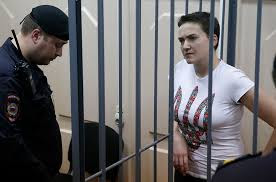 |
| Nadezhda Savchenko, the “Ukrainian Joan of Arc” ... |
 |
| ... has a terse message for Vladimir Putin and his cronies. |
Paris Talks on Ukraine Conflict Founder over Franco-German Polling Proposal. Foreign ministers from France, Germany, Ukraine, and Russia met in Paris on March 3rd and 4th to discuss possible solutions to the civil war in southeastern Ukraine, but Ukraine and Russia rejected a Franco-German proposal to set up internationally sanctioned voting sanctions in the Russian-backed rebel republics. In particular, Ukraine’s foreign minister, Pavlo Klimkin, said, talks foundered over Russia’s unwillingness to admit that it was backing the separatists. “It was a very difficult meeting,” Klimkin told reporters afterward, and Germany’s foreign minister, Frank-Walter Steinmeier, grumped that he was “not satisfied by the way in which Kyiv and Moscow have been leading these negotiations.”
10 Killed in Eastern Ukraine Fighting; Putin Gives Puppy to Little Girl. In other news from the civil-war-torn areas of eastern Ukraine, 10 people were killed and 11 injured in two weeks of fighting between the Ukrainian military and separatist rebels backed by Russia. Three Ukrainian soldiers died and two were injured when their vehicle hit a landmine in the self-proclaimed Luhansk People’s Republic (L.P.R.) in eastern Ukraine on March 1st. Around the same time, according to the Ukrainian government, three soldiers were hurt in firefights in different parts of the Luhansk and Donetsk“people’s republics.” This follows the deaths of two civilians on February 27th after they set off a trip wire in the so-called L.P.R. On March 3rd, the Ukrainian military reported that one of their soldiers had been killed by a rebel sniper in an L.P.R. zone. And a Ukrainian military spokesman reported on March 5th that two Ukrainian troops had been killed in a battle near Mariupol, a port city in Donetsk oblast which is under central-government control. Five more had been wounded over the previous 24 hours, the spokesman said. In an announcement on March 12th, the Ukrainian military said two Ukrainian soldiers had been killed within the previous 24 hours, both in the vicinity of Donetsk. A third was injured. But it is not as though President Vladimir Putin is refusing to take any action to alleviate the suffering in southeastern Ukraine: on March 4th, Putin responded to a letter from an 11-year-old refugee of the civil war, now living in the illegally-Russian-occupied Crimea, by granting her wish for a chihuahua puppy. The girl, Aline, whose family is from Dobropole, in Donetsk oblast, received the dog personally from the Russian deputy governor of occupied Sevastopol, Crimea, Yevgeny Dubrovnik. Alina had written the letter after her parents told her that they could not give her a puppy but Putin could.
 |
| A little girl has her puppy, and all is well in Ukraine. |
Russian Regime in Crimea Prosecuting Tatar Council for “Extremism.” The supreme court in Russia’s illegally annexed Republic of Crimeais examining a legal case against the Mejlis (council) of the Crimean Tatar People, accused by the Kremlin of extremism and terrorism. The suit, filed March 2nd by Crimea’s public prosecutor, the international sex symbol Natalia Poklonskaya, beloved of millions of Japaneseanime fans, runs to 500 pages and accuses the Mejlis of everything from inciting riots to causing the electricity blackouts which have been used by pro-Ukrainian insurgents to isolate the peninsula, which Russia invaded and annexed from Ukraine in 2014. Poklonskaya told the news agency TASS that her criminal suit also singles out the Mejlis’s chairman, Refat Chubarov, as well as the spiritual leader of the Tatars, Mustafa Dzhemilev; both live in exile in mainland Ukraine. Meanwhile, Ukraine’s president, Petro Poroshenko, on March 9th urged the Turkish parliament to recognize the Soviet Union’s 1944 deportation of the Crimean Tatar population as “genocide”—apparently unaware that Turkey is not exactly big on recognizing genocides.
 |
| She put the “cute” in “prosecutor”: Crimean public prosecutor and Internet sex symbol Natalia Poklonskaya is preparing to criminalize the Mejlis of the Crimean Tatar People. |
Chechens Wail in Grief over Loss of Kadyrov amid Rumors of Reappointment. Speculation is rife amid what on the face of it resembles a public outcry against the decision of the Chechen Republic’s president, Ramzan Kadyrov, to retire from politics. A group called the Civic Forum of the Chechen Republic stated that “society sees no alternative” to Kadyrov “and there can be no talk of successors,” and when that quotation appeared on Kadyrov’s office’s official website, it created the impression that Kadyrov was preparing to revoke his announcement late last month that he would resign when his term runs out next month. Kadyrov said on March 2nd that he would abide by any decision on his future that President Vladimir Putin might decide to make, and by the next day Moscow’s compliant R.B.K. news service was claiming leaks from federal officials to the effect that Putin was planning to appoint him to rule Chechnya for another five-year term. Meanwhile, on Instagram, Kadyrov’s favored medium and the political “public square” in the republic, in southwestern Russia’s North Caucasus region, photographic memes abound of children crying over the prospect of a Kadyrovless Chechnya and squads of citizens holding signs reading, “Ramzan, don’t go!”
 |
| “Ramzan, don’t go!” |
Masked Mob Beats Rights Team at Chechen–Ingush Border, Sparking Outcry. Meanwhile, business proceeds as usual in the Russian Caucasus: on March 9th, a minibus ferrying Russian and Scandinavian journalists and human-rights investigators from the Republic of Ingushetia back into the Chechen Republic after a day trip was surrounded and assaulted by a mob of about 20 unidentified masked attackers. All eight people aboard were injured in the attack, which occurred just on the Ingush side of the border, and five ended up in the hospital. (Later reports said six were injured and four hospitalized.) The vehicle was set on fire. The investigators were from the international Committee against Torture (CAT), one of the few groups still allowed to investigate rights abuses in Russia’s North Caucasus. An attorney for the committee, Dmitry Utukin, said the attackers “said, ‘There is nothing for you to do in Chechnya. You aren’t human rights defenders but supporters of terrorists.’” One of the victims, Öystein Windstad, a reporter from Norway, said, “It was awful. I thought I was going to die. They tried to pull us out of the bus, hitting us with batons and sharp objects, and I fought as hard as I could. I thought if they got us out of the bus, I’d be dead.” Winstad escaped the bus through a window, then “ran toward a dark field and a few seconds after I jumped out of the car, the whole bus exploded. It was completely in flames just five seconds after I jumped out.” The following day, while victims were still recovering in the hospital, five vehicles converged on CAT’s offices in Karabulak, Ingushetia, and disgorged armed men in camouflage who stormed into the building and vandalized it. But local police say no break-in occurred, despite the fact that video of it was posted online. Tanya Cooper, who investigates Russia for Human Rights Watch, said, “These brazen attacks on journalists and human rights defenders show how dangerous it is to report on human rights abuses in the North Caucasus. The authorities have made no meaningful attempt to prevent or investigate the repeated attacks in the North Caucasus on people who criticise the government.” That view was echoed by the Committee to Protect Journalists, which pointed out that the incident followed “a burst of menacing comments on social media and in the press ... by government officials in Chechnya” and that it “was enabled by the government’s inaction in the face of overt hostility to the press.” A spokesman from President Vladimir Putin’s office called the incident “absolutely unacceptable” “hooliganism,” but added that it expected local authorities to take the lead in finding and prosecuting the attackers. Ingush republican investigators, including the interior minister, Alexander Trofimov, were soon visiting the scene of the crime. Eventually, Putin ordered the federal interior ministry to take a hand in the matter as well. Chechnya’s “human-rights ombudsman,” Nurdi Nukhazhiyev, said the whole incident was a publicity stunt planned by the human-rights activists themselves and that there was no actual attack. Later, on March 11th, in the Ingush city of Nazran, a car bomb exploded adjacent to a mosque run by an imam whom the Chechen president Ramzan Kadyrov had targeted with harsh rhetoric for his jihadist and anti-Sufist views. Five people were injured, including the radical imam.
 |
| Chechnya’s president, Ramzan Kadyrov. Boy, Putin’s Russia is just all about puppies and kittens, isn’t it? |
ISIS Declares North Caucasus Caliphate, Urges Russian Muslims to Kill Apostates. In southwestern Russia’s North Caucasus region, the “Caucasus Province” chapter of the Islamic State terrorist group (a.k.a. ISIS) consolidated its position as successor to the largely dispersed Caucasus Emirate movement with a new video released on March 5th calling on Russian Muslims to “kill apostates,” oppose President Vladimir Putin, and implement shari’a (Islamic law). The video, titled “Profitable Trading,” asserts, “The Caliphate is already here,” and it claims that a Caucasus Province militant, Abu Abdurahman, was the one who carried out a car bomb in Dzhemikent, in the Republic of Dagestan, on February 15th that killed two Russian police officers. One militant in the video tells the camera, “Thanks to Allah, we have many brave brothers here with us and millions of Muslims in Russia. Let’s get together, my brothers, seize a territory, and expand it. It is not difficult to find weapons in Russia.” The video ends with what is claimed to be the execution of a Russian spy.
BITS OF ASIA THAT LIKE TO PRETEND THEY’RE PART OF EUROPE
Kazakhstan Takes Steps to Prevent Crimea-Style “Stealth Annexation” by Russia. The authoritarian president of Kazakhstan, Nursultan Nazarbayev, whose lock-step loyalty to President Vladimir Putin faltered two years ago when Russia invaded and annexed Crimea, has begun exploring how to prevent Kazakh citizens from acquiring phony or ill-gotten Russian passports, Reutersreported this month. The phenomenon of the fifth of the population who are ethnic Russian seeking closer ties to the Motherland is a sensitive one in Kazakhstan, since Russia has often distributed passports to ethnic Russians as a kind of proxy invasion in places like Crimea, southeastern Ukraine, Transnistria, and Abkhazia, as part of a Putin-innovated strategy some call “stealth annexation.” Nazarbayev’s administration is also encouraging ethnic Kazakhs to settle in heavily ethnic-Russian regions, like its far north, which abuts Russia’s Siberian steppes and is home to a large Cossack host.
Georgia, Two Breakaway Republics Exchange 17 Prisoners. The Republic of Georgiaconcluded a prisoner exchange with two of its de facto independent secessionist regions, Abkhazia and South Ossetia, on March 10th, on a bridge spanning the Republic of Abkhazia’s eastern border. The 13 Georgians released had been imprisoned for six to seven years, for border-crossing violations. They were exchanged for four South Ossetians who had been held for a terrorist attack in Gori, Josef Stalin’s South Ossetian home town, in 2005. Meanwhile, a landmine left over from the 2008 South Ossetia War between Russia and Georgia engulfed two hunters in an explosion in South Ossetia, it was reported on March 6th. One of the hunters was said to be in critical condition. The incident occurred in the forest near the village of Zar, according to the republic’s Ministry of Emergency Situations.
Azerbaijan, Armenia Blame Each Other for Border Skirmishes That Kill up to 18. The war between Armenia and Azerbaijan over Nagorno-Karabakh flared into violence again this month, leaving three dead—or 18, depending on whom you believe. According to the defense ministry of Armenia’s unrecognized client state within Azerbaijan, the Nagorno-Karabakh Republic (N.K.R.), Azerbaijani forces attacked N.K.R. positions on the night of March 10th and 11th, firing more than 5,000 rounds of ammunition. The N.K.R. called it a “commando raid” and said it was unsuccessful, with the Azerbaijani side suffering two fatalities and a number of injuries. “It is remarkable,” the ministry said, “that ... the enemy used artillery fire not only against Armenian positions ... but also territories that are located at quite a distance from the line of contact. This is unprecedented since the signing of a ceasefire agreement in May 1994. One can draw one conclusion from this: the adversary has adopted a tactic aimed at destabilizing the situation in the conflict zone.” The Azerbaijani government said that their attack had been meant “to prevent a subversive act” by the Armenian military against Ağdam, an abandoned Azeri town within N.K.R.-controlled territory. Azerbaijan claims 15 Armenian troops were killed. The evening after the initial incident, on March 12th, an N.K.R. soldier was killed by a grenade along the border.
Georgia Recognizes Nagorno-Karabakh—No, Not That Georgia, the One in America. The House of Representatives of the State of Georgia, in the United States, on March 2nd passed a resolution extending recognition to the Nagorno-Karabakh Republic (N.K.R.). Georgia is now the sixth state to recognize the N.K.R., although these are symbolic statements and only an establishment of ties at the federal level, by the U.S. Department of State, would count as diplomatic recognition. On March 4th, the U.S. ambassador in Azerbaijanreaffirmed the U.S. government’s non-recognition of the N.K.R. In another victory for the Armenian-American lobby’s legislature-bullying tactics, the Kentucky legislature on March 7th defeated a resolution supporting Azerbaijan’s position in the Nagorno-Karabakh conflict after aggressive lobbying by the Armenian National Committee of America (A.N.C.A.). But in Hawaii, on March 11th, the state Senate defeated a resolution that would have recognized the N.K.R., mainly because of the intervention of the Azerbaijani consulate in Los Angeles, California, whose consular district includes Hawaii.
Flemish Nationalists Lead Belgian Delegation to Armenia, Artsakh. Two Flemish nationalist politicians from Belgium arrived in the unrecognized Nagorno-Karabakh Republic (N.K.R.) (a.k.a. Artsakh Republic) on March 13th as part of a seven-member delegation’s visit to the N.K.R. and to its sponsor nation, the Republic of Armenia. One of the delegates, Karim Van Overmeire, a member of the Flemish Parliament for the conservative New Flemish Alliance (Nieuw-Vlaamse Alliantie, or N.-V.A.) party, said outright, “Artsakh is not only the stronghold of Armenia, but also of Europe” (which is slightly odd, since, being part of the South Caucasus, is in Asia). N.K.R.’s claimed territory is regarded by nearly the entire world as part of Azerbaijan which was illegally seized by Armenia after the fall of Communism and established as a puppet state. The N.K.R. is also a client state of the Russian Federation—President Vladimir Putin’s muscular ultranationalism being beloved by far-right politicians in Belgium and elsewhere in western Europe and North America. The other Flemish Parliament member, Karl Vanlouwe, of the center-right Christian Democratic and Flemish (Christen-Democratisch en Vlaams, or C.D.&V.) party, was more circumspect, acknowledged the differences between the Artsakh and Flemish struggles for self-determination, saying, “I cannot compare the Flemish peaceful struggle for identity with the complex situation created in Nagorno-Karabakh. It is hard to imagine that such a meeting would be organized around thirty years ago only because there was a war going on in here.” Overmeire is a former member of the separatist and far-right extremist Flemish Interest (Vlaams Belang) party.
Greek Foreign Minister Snubs Turkish Counterpart During Cyprus Visit. Talks on reunifying the island of Cyprus proceed apace, but when Turkey’s foreign minister, Mevlüt Çavuşoğlu, offered to drink coffee on the island with Greece’s foreign minister, Nikos Kotsias, the latter demurred saying, “I’m not ready for that.” The offer involved a trip together to the southern part of the island ruled as the Republic of Cyprus, lunch at the Green Line separating the two halves, and then an after-lunch coffee in the Turkish Republic of Northern Cyprus, a puppet state of Turkey. Çavuşoğlu later said that what Kotsias probably meant was that members of the Greek, Cypriot, and Turkish publics—not all of whom support reunification—are not ready for it.
MIDDLE EAST
Navigation App Misleads Israeli Soldiers into Deadly Refugee-Camp Mêlée. Two disoriented Israeli soldiers, misled by a global positioning service (G.P.S.), drove their jeep into a Palestinian refugee camp in the West Bank over the night of February 29th to March 1st, were pelted with rocks and Molotov cocktails, and ended up shooting one person dead. Other Israeli troops needed to go in and rescue them, which they did, but not without further casualties. The soldiers unharmed, but 10 people were also injured, in addition to the dead man, a 22-year-old student. They were using “Waze,” a G.P.S. service owned by Google; they had apparently turned off the “avoid dangerous areas” feature of the application.
13 Dead in Ongoing Palestinian Violence, Including Stabbing Attacks. Violence between Palestinians and Israelis in the occupied territories continued unabated in the first half of March, notably with a continuing wave of Palestinian knife attacks, including one that killed a Jewish citizen of the United States. Two Palestinian 17-year-olds with a knife and two wooden sticks were shot and killed by Israeli soldiers on March 2nd after they fought their way into a home in an illegal Jewish settlement on the West Bank, were ejected, concealed themselves in a ritual bath, and then tried to stab the soldiers. The father of the family under attack was wounded in the head. On the same day, two Palestinians injured two Israeli soldiers in a stabbing attack near Nablus. And in Hebron, a young schoolteacher crossing the picket line to work during a strike was splashed in the face with acid. The Palestinian Authority has blamed Hamas for the attack. The next morning, in the Jordan Valley near Jericho, a 14-year-old Palestinian girl stabbed and wounded an Israeli policeman who was directing traffic. A Palestinian woman was shot dead by Israeli soldiers in the West Bank on March 4th as she tried to ram them with her car. One of the soldiers was wounded. Also on March 4th, a Palestinian man stabbed two policemen near Jerusalem’s Old City and was subsequently shot and killed by police. Al Jazeera aired a video clip showing the officers shooting the man repeatedly while he was already on the ground. On March 8th, just as the U.S. vice-president, Joe Biden, was arriving in the country for a two-day visit, a spate of stabbing attacks took place, including, in Jaffa, a fatal stabbing of an American by a Palestinian. The American was Taylor Force, a 28-year-old graduate student in business at Vanderbilt University in Tennesseewho was also a veteran of the Iraq and Afghanistan wars. On the same day, a Palestinian shot at police, near Jerusalem’s Old City, wounded one, and fled, injuring another officer, before being shot and killed. And in other almost simultaneous incidents a Palestinian was shot and killed after stabbing a Jewish man in the neck in Petah Tikvah, and a Palestinian woman in her fifties was shot and killed near the Old City after trying to stab Israeli soldiers. On March 11th, a 19-year-old Palestinian man stabbed and injured a 29-year-old yeshivah student in the Old City before being arrested. The same evening, in Beit Horon, an illegal Jewish settlement in the West Bank, a Palestinian shot two Israeli soldiers in a drive-by shooting, injuring both, and then escaped. On March 12th, a 10-year-old Palestinian boy and his six-year-old sister in northern Gaza Stripwere killed by shrapnel during an Israeli airstrike on suspected Hamas training camps, which were being targeted in retaliation for missile attacks from the Gaza Strip into Israel. On March 14th, three Palestinians who attacked Israeli troops with car-ramming and gunfire attacks, one near Hebron, were shot dead by return fire. One soldier was slightly wounded.
New French Foreign Minister Backpedals from Fabius Vow on Palestine Recognition. The new foreign minister of France, Jean-Marc Ayrault, clarified on March 9th his government’s position on Palestinian recognition. He said that, while he aimed to revive talks on a two-state solution between Israel and the Palestinian Authority, France would not “automatically” grant diplomatic recognition of the State of Palestine in the case of a failure of the talks. However, Ayrault, who was on a visit to Cairo, Egypt, when he made the comments, did not rule out recognition of Palestine altogether. In January (as reported at the time in this blog), Ayrault’s predecessor, Laurent Fabius, had caused controversy by speaking more unambiguously about French intentions for recognition. “There is never anything automatic,” Ayrault said. “France will present its initiative to its partners. It will be the first step, there is no pre-requisite.”
U.S. Publisher Pulps Thousands of Textbooks after Outcry over “Anti-Israel” Maps. In the United States, McGraw-Hill Education, a major publisher of textbooks, is recalling and destroying thousands of copies of Global Politics: Engaging in a Complex World after complaints over its coverage of the Middle East. The reception of the book had been fine since its publication in 2012 until a blogger known only as “Elder of Ziyon” this month whipped up a tempest online over what he called the “anti-Israel” maps. “A mix of diplomatic and military actions and expanded Jewish settlements since the founding of modern Israel,” reads the book on page 123 (see above), “has led to a gradual decline in Palestinian-held territory—which explains why the territory remains one of the central sticking points in the long-standing Israeli–Palestinian conflict.” Accurate so far. Also accurate are four accompanying maps, labeled 1946, 1947, 1946-67, and 2000, showing the shrinkage of Palestinian-controlled territories over that period, to today’s tiny handful of communities. Are the maps“anti-Israel,” or is it just the reality and the facts that make Israel look bad? Now thousands of students won’t even have the chance to ask that question.
Iran Foils Terror Plot in Restive Majority-Arab Region Near Iraq Border. Officials in Iran reported on March 7th that a terrorist plot was foiled in the sometimes restive region of Khuzestan, the only majority-Arab part of the country. Details were scarce, but the interior ministry said that the previous night, in a battle with security forces, a terrorist cell had been wiped out, capping an extended campaign against the group. The ministry also said that several terror plots had also been prevented through similar operations over the previous months, including an operation in Sumar, near the border with Iraq, in February, and two thwarted terror plots during the February 26th elections. Officials categorized the perpetrators as “Takfiri terrorists,” a term which tends to mean Sunni extremists, including the Islamic State, al-Qaeda, etc.
AFRICA
ISIS Launches Cross-Border Raid into Tunisia from Smaller Libyan Stronghold. The Islamic State terrorist group (a.k.a. ISIS) used its de facto independent city-state in and around Sabratha, in northwestern Libya, as a staging ground for its first significant cross-border attack into Tunisia on March 7th. The attackers were apparently Tunisian nationals who had joined ISIS, and experts say that the Sabratha statelet does not take orders from the larger ISIS pseudo-state which covers about 150 miles of coastline centered on Sirte, to the east. Among the dead in the attack, which focused on the town of Ben Guerdane, were a local official from Nidaa Tounes (“Call of Tunisia”), the country’s governing political party, as well as, on the other side, the lead ISIS judge in Sirte, Abu Mouad al-Tunisi, who is a Tunisian national. The following day, the internationally recognized Libyan air force launched a series of bombing sorties on Sirte. Casualties included three children, whose mother was also wounded. On March 9th, ISIS forces attacked a military checkpoint just south of Misrata, near Tripoli, killing three.
Ban Ki-Moon, at Refugee Camp, Sympathizes with Sahrawi Plight, Angering Morocco. The United Nations secretary general, Ban Ki-moon, visited a Sahrawi refugee camp in Algeria on March 5th and spoke forcefully in favor of self-determination for the Sahrawi people, most of whose homeland, the former Spanish Sahara, is illegally occupied by Morocco. He was received by Mohamed Abdelaziz, who is president of the partially recognized Sahrawi Arab Democratic Republic (S.A.D.R.) and heads the Polisario Front rebel group. “This visit enabled me to see with my own eyes the sufferings of the Sahrawi refugees,” Ban said. (At one point, unknown persons threw stones at Ban’s motorcade.) On March 8th, the Moroccan government reacted angrily to Ban’s comments, calling them “verbal outpourings ... and unjustified gestures of deference” and adding, “Far from achieving the stated goal of his visit to relaunch political dialogue, the secretary general's comments could jeopardise the process.”
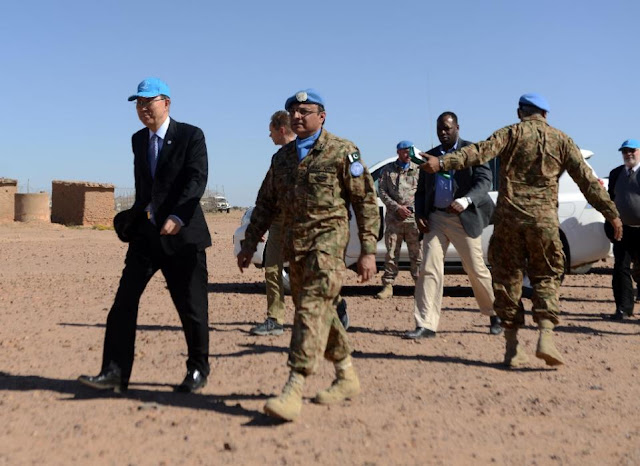 |
| Ban Ki-moon at a Sahrawi refugee camp this month |
Sahrawi Prime Minister Hosts Delegation from Basque Provisional Government. The prime minister of the partially recognized Sahrawi Arab Democratic Republic (S.A.D.R.) formally received a delegation from a provisional Basque government on February 29th. The premier, Abdelkader Taleb Omar, who operates from a provisional capital at Chahid El-Hafed because most of his country is illegally occupied by Morocco, hosted Maria Angeles Elorza Zubiria, the Basque “secretary of foreign action,” and Paul Ortega Etcheverry, director of the Basque “Agency for Development Cooperation,” among other officials. The dignitaries took part in a celebration, in Dakhla, of the 40th anniversary of the declaration of S.A.D.R. independence. Basque separatists are particularly aggressive in forming diplomatic-style ties with other aspirant nations.
Ethiopian Students March against Oromo Crackdown; Western Journalists Arrested. Dozens of students from Addis Ababa University marched through Ethiopia’s capital on March 8th to demand an end to the police crackdown on the Oromo ethnic group that has been unrelenting since anti-government demonstrations began in November. As many as 200 Oromos may have been killed, according to non-governmental sources. Some demonstrators held signs reading, “We Are Not Terrorists—Stop Killing Oromo People.” The march’s endpoint was the United States embassy, since the U.S. is a major aid donor to Ethiopia. Earlier, on March 3rd, Ethiopian authorities detained two journalists and a translator without charge while they were attempting to cover ongoing Oromo protests. They were held for 24 hours, according to the Foreign Correspondents’ Association of East Africa (F.C.A.E.A.). The journalists are William Davidson, a correspondent for Bloomberg News, and Jacey Fortin, a freelancer. On March 10th, Ethiopia’s president, Hailemariam Desalegn, took the unusual step of apologizing before parliament for deaths caused by the police crackdown, but he still lay the ultimate blame with what he called “anti-peace forces” in Oromia—likely meant to refer partly to Eritrea, whose government Desalegn has blamed for inciting the Oromo uprising. Originally, in November, the protests were about the expansion of Addis Ababa’s boundaries into the vast Oromiya region, but they have since become protests demanding self-rule.
Trial of Jihadist Militant Begins in Hague for Destroying Sacred Artifacts in Mali. An unprecedented criminal proceeding began in the International Criminal Court (I.C.C.) in the Hague, in the Netherlands, on March 1st as an Islamist militant faced charges of destroying priceless cultural artifacts in 2012 in northern Mali. The defendant, Ahmad al-Faqi al-Mahdi, is believed to be a member of the al-Qaeda-linked militia Ansar ad-Dine, which took advantage of a Tuareg separatist uprising in late 2011 to establish control over the northern two-thirds of Mali as a self-declared “Independent State of Azawad” before a defeat by France’s armed forces in 2013. In conjunction with another jihadist group, the Movement for Unity and Jihad in West Africa (Mouvement pour l’unicité et le jihad en Afrique de l’Ouest, or MUJAO), destroyed and looted an unknown number of tombs, libraries, and other ancient structures in and around Timbuktu. “These were sites dedicated to religion and historic monuments,” the prosecutor, Fatou Bensouda, said, “and did not constitute military objectives. Many of the demolished sites are associated with local forms of Sufism, a form of Islam that salafists such as Ansar ad-Dine and MUJAO consider heretical. Al-Mahdi was not a fighter for Ansar ad-Dine but a teacher and scholar, whose job involved the “Islamic Tribunal” set up in northern Mali to enforce their strict brand of Islamic law. He is one of the few surviving Ansar ad-Dine leaders that it has been possible to prosecute. Meanwhile, Tuareg clan leaders signed a United Nations–brokered cease-fire near Gao, in northern Mali, according to the United Nations Multidimensional Integrated Stabilization Mission in Mali (Munisma)—a prerequisite to bringing peace to the region.
 |
| Members of Ansar al-Dine breaking open a Sufi shrine in Mali before destroying it, in 2012. |
10 Killed as Galmudug Forces Repel al-Shabaab from 2 Villages. The ministry of information of Somalia’s de facto independent Galmudug Statereported March 1st that its armed forces had pushed the al-Qaeda-linked jihadist militia al-Shabaab into retreat from two villages, Ad and Eel-Abdi. At least 10 people were killed in the fighting. The information minister, Mohamud Aden Osman, said that the rout should restore public confidence in Galmudug’s ability to keep jihadist terrorists at bay. The next day, it was being reported that, over the course of the previous night, Ahlu Sunna Wal Jamea, an anti-jihadist Sufi militia, had taken control of the town of Dhusamareb from national Somalian military units in league with Galmudug.
Some Ogonis Resent Rivers State Governor for Politicizing Military Manhunt. In Bori, the notional capital of the Ogoni ethnic group’s homeland in southern Nigeria, thousands of young demonstrators rallied against the governor of Rivers State, who they feel overstepped his bounds by criticizing Nigerian military incursions to root out militants in Ogoniland. The governor, Nyesom Ezenwo Wike, defied the central government angrily last month (as reported in this blog) after a reckless army manhunt for a wanted Ogoni former rebel leader on February 22nd and 23rd left possibly as many as 18 dead. Oji Ngofa, deputy national secretary of the All Progressives Congress (A.P.C.), spoke in support of the military crackdown. Most demonstrators seemed less concerned with applauding the dragnet against Ogoni activists and more worried that Wike’s politicization of the controversy will spread the conflict into Rivers State’s partisan divides. The Movement for the Survival of the Ogoni People (MOSOP), on the other hand, sent a petition of protest to Nigeria’s president, Muhammadu Buhari, titled, “Protest against the Unprovoked Military Invasion of Ogoni Communities Occasioning Wanton Killings of Innocent Citizens and Residents.” In an ongoing Senate probe into last month’s violence, a representative of the Nigerian army tried to justify the incursion, testifying that one of its security informants was buried alive by a Rivers State cult leader, among other atrocities that demanded intervention. (On the morning of March 7th, there was a gun battle in Buguma, the Kalabari Kingdom’s capital, in Rivers State, with one boy or young man being shot to death and then burned; details on that incident are scarce.) Meanwhile, in London on March 2nd, a court gave the go-ahead for a lawsuit against Royal Dutch Shell and its Nigerian subsidiary by representatives of Ogoni plaintiffs citing environmental destruction. The city of Bori, which has been the focus of the military operations, was virtually shut down during the weekend of March 5th and 6th due to residents demonstrating in the streets to protest the military incursions.
Biafran Icon Nnamdi Kanu Refuses to Appear in Court, Citing Threats to Life. The Biafra independence leader Nnamdi Kanuappeared in court on March 7th, and the trial was adjourned till the 9th, to allow time for a screen to be erected to protect witnesses who wanted to testify without fear of retaliation, but the next day his lawyer told the court that he had advised his client not to appear in court, over fears for his life. The attorney, Ifeanyi Ejiofor, told the media that on the first trial day his life had been threatened by a member of Nigeria’s dreaded State Security Service after Ejiofor challenged their decision to bar members of Kanu’s family from the courtroom. It was also reported on March 9th that Kanu, who heads the organization Indigenous Poeple of Biafra (IPoB), had issued an apology to Nigeria’s president, Muhammadu Buhari, an avowed enemy of the Biafran cause since the 1960s, for broadcasts on Radio Biafra in which he referred to the president “as a terrorist, evil, and a paedophile.” He also apologized for earlier comments critical of the former president, Goodluck Jonathan, “because it is un-African to be rude or insolent to elders.” (See my recent article from this blog, in which Biafra is one of “Ten Separatist Movements to Watch in 2016.”)
 |
| Nnamdi Kanu |
MASSOB Entreats Norway Not to Deport Biafran Activists to Nigeria. The Movement for the Actualisation of the Sovereign State of Biafra (MASSOB) is sounding the alarm over high-level negotations between the governments of Norway and Nigeria to deport home two pro-Biafra activists, one of whom is married to a Norwegian woman. Uchenna Madu of MASSOB pleaded with the Norwegian government in a statement, reading, in part, “Do not deport Biafrans to Nigeria, Nigeria is doomed with [President Muhammadu] Buhari’s support to Palestine.” Madu referred to plans to fly the two men—Lotachukwu Okolie and Onyedikachi Ani—from Belgium to Lagos on March 9th as Norway’s “wickedly aligning with Nigeria to eliminate innocent Biafrans.” Okolie has said specifically that he fears for his life if he is forced to return to his homeland and threatened suicide in an interview with a reporter. Meanwhile, in London, a presentation at Chatham House by the governor of Nigeria’s Imo state was interrupted on March 9th by an IPoB member wielding a Biafran flag, who cited the deaths of his relatives in the Biafra War and called the governor, Rochas Okorocha, a murderer.
Biafra Separatists Call Fulani Herders “Secret Army,” Tell Them to Go Back North. A joint statement by two groups working for independence for Biafra on March 6th gave notice to all Fulani herdsmen in what it called Igbo territories to return to northern Nigeria because it could not guarantee their safety. The statement was released in Enugu by the Movement for the Actualisation of the Sovereign State of Biafra (MASSOB) and Indigenous People of Biafra (IPoB). It states, “We can no longer tolerate the systematic killing of our people and invasion of our land in the name of cattle grazing. Seventy percent of Fulani herdsmen in the eastern region are Northern-trained secret army assigned for devastation and secret killing of Biafrans.” It also referred to them as an “Arewa secret army in disguise as Fulani herdsmen,” using a Fulani term for “north”—arewa—which has sometimes been proposed as the name for a northern Muslim republic.
 |
| Victor Umeh |
Pope Condemns Nigerian Crackdown; Buhari Calls Biafra Agitators “Jokers.” The separatist organization Indigenous People of Biafra (IPoB) released on March 1st the text of Pope Francis’s comments to an IPoB delegation that demonstrated in St. Peter’s Square in Vatican City two days earlier. The pope pleaded for peace and told Biafrans to be patient, but also had harsh words for the murderous regime in Nigeria, saying, “It is never too late to convert an oppressor to change from his evil activities, including murderous activities, but it is urgent, it is now, let them begin today to change from their oppression and killing of innocent people through all sorts of violent means, including the jackboot of the military.” Meanwhile, Nigeria’s president, Muhammadu Buhari, spoke more forcefully than ever before against Biafran separatism during a state visit to Qatar. He reminded the public that 2 million people had died in the Biafra War (neglecting to mention that the military in which he then served as an officer—serving a Muslim junta whose illegal seizure of power he helped orchestrate—did most of the killing), and he called the current Biafran movement a bunch of “jokers.” His interviewer, from the Al Jazeera network, asked the president to comment on a video clip he had with him showing Nigerian troops firing on unarmed pro-Biafra demonstrators. Buhari refused to watch the clip, but said he would not relent in putting down the movement.
Cameroon Swindles Akwa Ibom Chiefs into Ceding Nigerian Territory. There were reports this month that the government of Cameroonhas illegally seized parts of Nigeria’s Akwa Ibom state. The state is near, but not adjacent to, the formerly disputed Bakassi Peninsula, which Nigeria ceded to Cameroon in 2006 after an International Court of Justice (I.C.J.) ruling in Cameroon’s favor, and Cameroon now administers, though some Efik and other ethnic groups on the Nigerian side still covet it. Members of the Effiat ethnic group in Akwa Ibom’s Mbo L.G.A. (local government area) say that Cameroonian officials lured village heads of 16 villages on mangrove islands into taking Cameroonian citizenship in exchange for “documenting” their positions of traditional authority. Not insigificantly, the territory in question includes 350 oil wells. A final demarcation of the Nigerian–Cameroonian border is ongoing, but the Akwa Ibom coast is not among the disputed areas. It is still unclear to what extent Cameroon’s central government is involved in the annexations.
Ashanti King in Ghana Vows to Stand by Subjects in Land Dispute with Fulani. In Ghana, His Royal Majesty Otumfuo Osei Tutu II, the Asantahene, or King of the Ashanti, reassured his subjects that he would not allow them to be bullied by Fulani interlopers. The monarch made the comments at an Ashanti Professionals Club (A.P.C.) function, not long after arriving from a trip to South Africa to find youths in the Ashanti communities of Tafo and Agogo holding demonstrations pleading with him to help them resolve conflicts over land and resources with the more northerly and predominantly-Muslim Fulani people. “ Upon my return,” Otumfuo Osei Tutu said, “I saw my people at the airport holding placards with inscriptions about what is happening in Tafo and Agogo. I want to assure them that I will continue to protect them, I won’t sit down for anyone to take the lands of my people away from them.”
 |
| King Otumfuo Osei Tutu II |
Ewe Group in Ghana Seeks Independence for Formerly German “Western Togoland.” A newly formed organization in Ghana called the Homeland Study Group Foundation (H.S.G.F.) has emerged this spring with the aim of creating a sovereign entity called Western Togoland out of the parts of Germany’s former African colony, Togoland, which was transferred to British rule after the First World War. In a 1956 plebiscite in the narrow strip of land, a United Nations trust territory known then as Trans-Volta Togoland (T.V.T.) confirmed its cession to Ghana (the United Kingdom’s Gold Coast Colony), on the eve of its independence, by a 58% majority, and the rest of the former German Togoland became today’s Togolese Republic. But southern parts of the T.V.T., homeland of the Ewe ethnic group, voted mostly against the cession, and Ghana’s first president, Kwame Nkrumah, put down Ewe insurrections in 1957 led by the Togoland Congress—around the same time that some Ashante and northern peoples were also calling for a separate state. The H.S.G.F. issued a declaration on February 8th of this year of its intention to secede from Ghana. “This is the beginning of the united effort of exerting final pressure to extricate ourselves from over 50 years ... of un-established union with Ghana which has not yielded any benefits—social, economic and financial security to the common people of the land,” the chairman of the H.S.G.F., Charles Kormi Kudjordjie, told a reporter during a congress a the Volta Regional House of Chiefs in Ho, in Ghaniaian Eweland. “Our wise men and women are again ready to strategise for the formula for coming out of the serfdom sooner than later. This congress is the launch pad for the missile attack at all fronts for independence. Whether it is here now, today, tomorrow is matter of choice that must not be delayed, but pursued vigorously.” But Papa Hogbedetor, an H.S.G.F. spokesman, interviewed on Ghanaian radio on February 10th, backpedalled, saying, “The Homeland Study Group Foundation is not calling for Western Togoland to break away, it’s not even a secession.” Rather, he said, his group wants a Western Togoland state “in union with Ghana.” The H.S.G.F. argues that, since Western Togoland voted for “union” with Ghana several weeks before Ghana existed, the subsequent establishment, in the Ghanaian constitution, of a unitary state violates the spirit of the free choice offered in the plebiscite. An expert in Ewe history, Dr. Kwame Botwe-Asamoah, disputes this reasoning and calls the new group “terrorists” and points out that members of the Akan and Guan ethnic groups, whose ancestors voted for the union with Ghana, also live in the H.S.G.F.’s proposed “Western Togoland.”
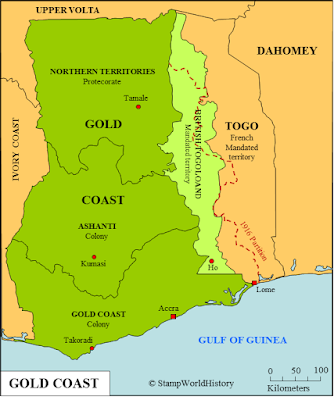 |
| The two green areas became modern Ghana. The light green area, originally part of “Togo” when it was a German colony, is what some Ewes would like to see become a distinct homeland. |
Kenya Police Tighten Dragnet on Mombasa Republicans, Citing Recruitment Push. Local authorities in Kenya’s predominantly-Muslim south-coastal region announced on March 9th the imposition of tighter security in the area after reports emerged of a new recruitment drive by the Mombasa Republican Council (M.R.C.). “We are trying to establish the driving force behind the fresh recruitment, particularly in Katsangani and Meticharaka,” said Mike Kimoko, deputy police commissioner for Tana Delta sub-county in Coast Province. “We have beefed up intelligence gathering and surveillance.” Ten M.R.C. were arrested for unlawful assembly in Kilifi County.
Boeremag Attempted-Coup Leader Beaten in Prison by Notorious Murderer-Rapist. The leader of South Africa’s white-supremacist Boeremag militia, Tom Vorster, claims he was assaulted in prison on March 1st by a prison warder and by a fellow inmate, Johan Kotze, dubbed “the Modimolle Monster.” Vorster said he was attacked during a stabbing rampage by members of a prison gang in Zonderwater Prison, in Gauteng province. Kotze is serving a life term for murdering his nephew and orchestrating the gang-rape and torture of his ex-wife. Vorster was sentenced to 35 years in 2013 for plotting with members of the Boeremag, an Afrikaner (Dutch South African) militia, to assassinate President (as he then was) Nelson Mandela, take over the reins of state, and reinstitute apartheid in a Boer republic.
ASIA
21 Die as Pakistan Battles Baloch Rebels; More “Disappearances” of Civilians Reported. The first half of the month saw over 20 reported killings of Baloch separatist rebels by Pakistan’s military, but Baloch rights groups are continuing to report the government’s abduction and killing of Baloch civilians, including women and children. A commander in the Baloch Republican Army (B.R.A.) was among three militants shot and killed by Pakistan’s security forces in southwest Balochistan province on March 2nd. A military spokesman said that weapons were recovered and that the militants had been guilty of killing laborers. Later in the day, in Kech district, four other B.R.A. militants were killed and two wounded in a raid by the Frontier Constabulary. But the B.R.A. claims that some bodies presented to the hospital in the city of Turbat as victims of the battle were in fact the corpses of innocent Baloch people—one of them a 15-year-old last seen in September—who had been abducted previously through the Pakistani government’s notorious practice of “disappearing” dissidents. Then, on March 9th, a shootout between security forces and the Baloch Liberation Army (B.L.A.) in Balochistan’s Sibi district left eight insurgents dead along with two Pakistani soldiers. Among the B.L.A.’s dead was their commander, Aslam Achou (a.k.a. Merick Baloch), who was a high-ranking B.L.A. spokesman. Meanwhile, according to the Unrepresented Nations and Peoples Organization (U.N.P.O.), Pakistani forces on March 5th raided the community of Mach, in Bolan district, and abducted four Baloch people: a man, a woman, and two children, a two-year-old and a two-month-old. Two others had recently been abducted in Turbat—all locations in Balochistan. In both cases, homes were looted and some set on fire. Then, five B.L.A. rebels were reported killed in Dera Bugti, according a Frontier Corps spokesman. And government sources told the media on March 3rd that attempts were underway to find a way to bring two prominent Baloch separatists back to Pakistan for trial. The two are Brahamdagh Bugti, head of the B.R.A., who was recently (as reported at the time in this blog) denied political asylum in Switzerland, and Harbiyar Marri, who leads the Balochistan Liberation Army (B.L.A.) from self-imposed exile in London.
 |
| Baloch victims of a government raid this month |
Kashmiris from Pakistan Side of Border Accuse Islamabad of Coddling Terrorists. Exiled separatists from the western part of Jammu and Kashmir, which is controlled by Pakistan, have come out accusing the Pakistani government of working against peace in the region by supporting terrorism elsewhere in Pakistan. “On the one side, Pakistan says it is fighting a war against terrorism,” said Shaukat Ali Kashmiri, secretary general of the United Kashmir People’s National Party (U.K.P.N.P.), during a United Nations event in Geneva, Switzerland, “but on other side, LeT [Lashkar-e-Taiba] terrorists are roaming freely and extremists are rallying every day, the Jaish-e-Mohammad is operating, and the Jihad Council, the outfit which has claimed the Pathankot attack, these are all benefitted by the state.” He included the Taliban in the list, as well, adding, “So, this is not the right way to fight against terrorism that you adopt the policy of pick and choose. In PoK [Pakistan-occupied Kashmir], the terrorist infrastructure is still intact and we always say that this region has been used as a launching pad for terrorist activities. I firmly believe that terrorists will not make Kashmir free.”
Milkman Held in Trampling Death, Burning of Queen of Chhatarpur and Princess. Two men are being held and accused of killing two members of the royal family of a former princely state on February 19th in India’s state of Madhya Pradesh. The victims were Queen Yuvrani, age 80, and her 40-year-old daughter Baby Raja, whose bodies were found badly burned in their palace. Yuvrani’s late husband, who died in 2006, was Rai Vijay Bahadur Singh, who had been rajah (king) of Chhatapur State, also called the Neguan dynasty, until its dissolution at Indian independence in 1947. Police say the two suspects in the double murder are Nandi Rajput, age 45, who supplied milk to the royal family, and his accomplice Harisingh Yadav. At the root of the murder was Rajput’s claim that the princess owed him sharecropping dues and that two years earlier she had falsely, he claims, implicated his brother in a jewelry theft. The two killers allegedly waited until the queen’s son, Raj Bahadur, had left town to attend a wedding. Police say that the men killed the two women by trampling them to death and then trying to create the impression that they had died in an electrical fire. (Yes, the princely state’s flag is the same as Bavaria’s, only upside-down.)
 |
| Chhatarpur police present to the media the suspects in the murder of two members of the royal family. And no, I have no idea what the plates of plantains have to do with anything. |
Separatist Extortionists Suspected in Kidnapping, Torture of Manipur Filmmaker. A filmmaker of the Meitei ethnic group was abducted from his home in Imphal, capital of eastern India’s Manipur state, tortured, and left to be found the next morning in critical condition. He was immediately taken to the hospital. The Patriotic People’s Front of Assam (P.P.F.A.) has denounced the crime, distancing themselves from more radical separatist fighters assumed to be behind the kidnapping. According to police, the filmmaker, M. Raghumani, was targeted because he was not paying protection money to an unnamed rebel group, which the P.P.F.A. says runs a parallel government in Manipur.
Telangana Activist, Paralyzed in Police Crackdown in 2011, Commits Suicide. From India’s newest state, Telangana, comes a sad coda to the decades-long struggle by the Telugu people to create the state out of the northern third of Andhra Pradesh. Telangana finally became a state in 2014, but one pro-statehood activist who was severely injured and permanently disabled during a police crackdown ended his life this month by hurling himself in front of a train near the Telangana town of Bhongir. The man, 40-year-old Jakkula Yakaswamy, of Turkalashapur, had vowed not to marry until statehood was achieved. But during the Telangana Joint Action Committee’s Arab Spring–style “Million March” in Hyderabad on March 10, 2011, police beat Yakaswamy with a baton, using police tactics condemned by international human-rights groups, and was paralyzed with a spinal injury. He was never unable to receive government assistance, fell into a depression, and took his life on the fifth anniversary of his injury.
 |
| Jakkula Yakaswamy, the Telangana statehood movement’s last martyr |
Hardline Kashmiri Separatist Icon Geelani, 86, in Hospital after Heart Attack. The political and spiritual leader of the separatist movement in India’s Jammu and Kashmir state, Syed Ali Shah Geelani, suffered a minor heart attack in New Delhi on March 10th and has been placed in intensive care in a hospital there. Within a couple days, Hurriyat spokespeople were saying Geelani was recovering quickly. Geelani, who is 86 years old, has been living in the national capital for health reasons; doctors had advised avoiding the cold weather and high elevations of Kashmir. Geelani leads the All-Parties Hurriyat Conference, an umbrella group for hard-line separatist organizations in the majority-Muslim state.
Separatist Hizbul Mujahideen Militant Killed in House Siege in Kashmir. A separatist fighter was killed during a battle with security forces in India’s disputed state of Jammu and Kashmir on March 6th. Troops were closing in on a house in the village of Buchroo that they had been tipped off housed two militants. The occupants of the house shot at the security forces, and one militant, Dawood Sheikh, of the Hizbul Mujahideen (H.M.) Islamist separatist militia, was killed. One member of the security forces was wounded. Later, on March 9th, two militants were killed in a gun battle with government troops in a botanical nursery in the southern Kashmiri village of Wandakhpora.
Thai Police Accused of Beating Detained Uyghur Migrants. The World Uyghur Congress (W.U.C.), an organization based in Germany which represents the mostly-Muslim Uyghur ethnic group in northwestern China, on March 4th accused the government of Thailand of “badly beating” six Uyghur men and denying them medical treatment. The Thai government issued a denial of the accusation three days later. According to the W.U.C., the six men were mistreated on February 29th by police at a detention facility for undocumented immigrants in Bangkok. The conflict apparently arose when the prisoners complained about police watching pornography in their presence.
Arrested Hong Kong Autonomist Leader Hints at Beijing-Orchestrated Kidnap Plots. The Hong Kong autonomist leader charged with rioting told the press on March 1st that someone with “powerful backing” had earlier threatened to kidnap him, pointedly mentioning the five dissident booksellers from the territory widely believed to have been “disappeared” by the Chinese central government. The activist, Ray Wong Toi-yeung said the man—who did “not speak Cantonese,” meaning he was not from Hong Kong and possibly not even from the south—warned him that “they” “will find me and catch me.” After the February 8th, unrest, Wong said, “there were different people trying to reach my family and I [sic] through different methods. ... There were elements of threats and bribes,” but “we did not accept any invitations nor make a response.”
 |
| Ray Wong Toi-yeung during his perp walk last month |
Monk in Sichuan, Teen in India End 6-Month Lull in Tibetan Self-Immolations. A six-month lull in a gruesome form of Tibetan protest ended on February 29th, with the self-immolations of a 16-year-old boy in northern India, followed shortly by a monk in Sichuan province. The Tibetan diaspora organization Free Tibet reported on March 2nd that three days earlier Dorjee Tsering, age 16, had doused himself in gasoline and set himself on fire outside his grandfather’s assisted-living facility in Dehradun, in India’s Uttarkhand state, demanding Tibetan independence. He was hospitalized in Delhi with burns over 95% of his body, and died in hospital on March 3rd. “I did discuss my intentions with my parents earlier,” he said after arriving the hospital, “who told me they would kill themselves if I did this.” On the same day as Tsering’s protest, a monk in China, in Sichuan’s Kardze Tibetan “Autonomous” Prefecture, immolated himself near his monastery. While burning, the monk, Kalsang Wangdu, “called out for Tibet’s complete independence,” according to Radio Free Asia. Bystanders intervened and tried to get Wangdu to a hospital, but he died on the way to the capital, Chengdu.
 |
| Dorjee Tsering, a 16-year-old martyr for Tibetan freedom |
Pamiris See Hints Tajikistan Planning to Rescind Badakhshan Autonomy. Activists in Gorno-Badakhshan, a sometimes-secessionist region of the former Soviet republic of Tajikistan, are raising increasingly vocal concerns over the authoritarian Tajikistani government’s increasing tendency to refer to their large territory as simply “Badakhshan province” and not the formal name Gorno-Badakhshan Autonomous Oblast (G.B.A.O.). Badakhshanis, who are mostly of the Pamiri ethnic group, which also extends into Afghanistan, are fearing that this presages a possible move by the central government to rescind the G.B.A.O.’s autonomy as a constitutional referendum nears in May during which voters will be asked whether to allow the authoritarian president, Emomali Rakhmon, to seek additional terms of office and ease the age restrictions for a possible succession by his son, Rustam Emomali. “Friends,” said one G.B.A.O. activist on Facebook, “there is an opinion that a referendum on the cancellation of Badakhshan autonomous status will take place in March this year.” Nor is it encouraging that Emomali last month renamed a Badakhshani village “Rakhmonobod.”
Armed Raid on Hospital Complicates Thai Talks with Muslims Rebels. The government of Thailand is blaming a series of apparently coordinated attacks on March 13th on the Patani Malayu National Revolutionary Front (known by its Malay acronym B.R.N., for Barisan Revolusi Nasional), which seeks independence for the country’s far-southern Muslim provinces. More than 10 armed rebels took over a hospital in Narathiwat province on March 13th, then used it as a base from which to fire upon an adjacent ranger outpost. The rangers did not return fire, out of concern for the hospital occupants’s safety. After about an hour-long barrage with assault rifles, the militants retreated into the bush and have not been located. The same day, unidentified gunmen fired at security officers in a train station in Cho Airong, and a bomb went off on a bridge near Yaning. No injuries were reported in any of the three incidents. The attacks came three days after the government’s chief negotiator said that talks with separatist rebels were progressing satisfactorily. Thailand, he said, had set forth its preconditions for talks, and Mara Patani, the umbrella group representing six separatist outfits (not including the anti-talks B.R.N.), is examining and contemplating those conditions. Right now both sides are awaiting word from Malaysia’s government, as mediator in the talks, on when the first next round will begin. One issue in play right now is whether and where to set up a cease-fire zone in Thailand’s three southernmost provinces, along the Malaysian border, where the insurgency is focused. The latest attacks make such a solution a bit less likely.
 |
| Pattani rebels on the attack in 2012 |
Southern Philippine Rebels Warn Failure of Autonomy Process Opens Door for ISIS. The head of the southern Philippines’ most visible Muslim separatist outfit warned the government on March 7th that the recent decision by the country’s legislature not to move forward on launching a new autonomous region for the Moro people could backfire. Murad Ebrahim, who chairs the Moro Islamic Liberation Front (MILF), which is doctrinally moderate in its Islam, told media in Kuala Lumpur, Malaysia, that the MILF now fears that the Islamic State terrorist group (a.k.a. ISIS) “can capitalize on this, because the sentiment of the people in the area is now very strong. The frustrations after the non-passage of the law—they can capitalize on that.” Murad says the MILF is pleading with ISIS-allied groups in the region to desist from violence in the region. But the Philippine government continues to insist that there is no evidence of any ISIS presence in the country.
OCEANIA
Papuans Protest Catholic Priest’s Arrest over Separatist Ties. In Manokwari, capital of Indonesia’s West Papua province, dozens of Catholic Papuans marched on March 2nd to protest the arrest and interrogation of Father John Djonga. The head of the Catholic Youth’s local provincial chapter, Thomas Jefferson Baru, demanded the police “stop criminalizing” Djonga, who was arrested on February 19th (as reported last month in this blog) after leading a prayer service at which a United Liberation Movement of West Papua (U.M.L.W.P.) banner was displayed. A police spokesman said that at the moment Djonga was only a witness, not a suspect.
New Zealanders Begin Voting on Whether to Swap Union Jack for Silver Fern. The first New Zealanders started receiving ballots March 3rd for a second round of voting on whether to keep New Zealand’s current flag, with the Union Jack canton and Southern Cross constellation, or switch to a snazzier one with a silver fern running diagonally across it. The Silver Fern Flag edged out four competing flags last year in the first round of voting, garnering 50.58% of votes cast. Now the vote is on whether a switch will be made at all. Voting ends on March 24th, and the final result is to be announced March 30th. Recent polls show two-thirds of the public prefers the current flag to the proposed one. But New Zealand’s Olympic yachting team will be practicing with both flags so that they are prepared for whichever of the two flags they end up needing to take to Rio de Janeiro, Brazil, for this year’s Summer Olympics. Emotions are running high over the flag in some quarters. On March 6th, an unidentified man hoisted down a Silver Fern flag flying alone on a pole outside the city hall, wrapped it in a bag, and left it on the mayor’s doorstep. He later told the local newspaper that for the city government to fly the flag by itself was a “total manipulation” of the referendum process. On March 9th, the electoral commission was investigating claims that a man in Auckland made on Facebook to the effect that he had stolen 300 mailed ballots from neighbors of his who he claimed “couldn’t care less.” “He had ticked the new flag option on all of them,” New Zealand media reported, “but it was not known if the papers have been cast.” Meanwhile, the Australian actor Hugh Jackmancame out in support of the Silver Fern Flag, saying that both Australia and New Zealand need to switch to new flags without the Union Jack.
Stuart Beck, New York TV Exec Who Helped Palau to Independence, Dies at 69. A television executive from Bronxville, New York, who became the unlikely midwife for Palau’s independence from the United States, died February 29th at the age of 69. Stuart J. Beck first visited the tiny Micronesian atoll of 20,000 or so people in 1976 to do an environmental-impact assessment of a petroleum port project, but he was recruited by locals to help usher the country—which had been part of the United States Pacific Trust Territory since the Second World War—to independence. He called the experience like being in “Athens in the time of Pericles.” Palau became its own sovereign state in 1994, but with strong apron strings still tying it to the U.S., which still provides its currency and its national defense, among other services. As a state in “free association,” it was not obvious that it should have its own seat at the United Nations. Beck thought otherwise and later says he told the Palauans, in effect, “Look, you don’t produce anything, you don’t manufacture anything, nobody’s after your labor pool, you don’t have anything that anyone wants, the U.S. already has defense and basing rights, so the only thing of value you have is your U.N. vote.” From 2003 to 2013 he served as the Palauan ambassador to the U.N., where he made Palau the closest lock-step ally of the U.S. in U.N. votes, even when it came to resolutions on Israel and Palestine—an issue on which the U.S. and Israel usually stand completely alone.
Pro-Independence Party Falls Short of Signatures Needed for Hawaiian Elections. The Aloha Aina Party, which supports independence for Hawai‘i, failed in its attempt to secure enough signatures to participate as a political party in elections, the Hawaii Tribune-Herald reported on March 1st. 707 signatures were required. But one party leader, Pua Ishibashi, said, “I think if anything we are more focused and even more committed. And to make sure that this moves forward in 2018, we’ll do everything we need to do.” He emphasized the need for education, adding, “I think a lot of these guys really don’t understand the queen, and all her patriots, they were all fighting for the vote.”
NORTH AMERICA
Founder of North Ontario Separatist Party Retires; Upstart Holliday May Take Helm. The founder of the Northern Ontario Heritage Party (N.O.H.P.), which sought to split off the vast, sparsely populated but resource-rich north of Ontario as a separate province within Canada, announced this month that he is retiring from politics, but a new leader is already eager to take up the mantle. Ed Deibel, who is 84 years old, founded the party in the mid-1970s and it never won a single seat in the provincial parliament. The party folded in 1985, and then Deibel rebooted it 25 years later with more modest goals of a fairer distribution of the north’s resource wealth. In 2014, Deibel ran for a seat in the Thunder Bay–Atikokan riding but got only 0.5% of the popular vote. He openly acknowledges that Trevor Holliday, a politically aggressive 33-year-old bus drive from North Bay, is the future of North Ontario separatism. “In the last election,” Deibel said, “we had three candidates including myself and we got under 1,000 votes so something’s wrong when we’ve got a guy in North Bay who started an online petition and he’s got thousands of signatures.” Holliday has already submitted a formal bid to replace Deibel at the party’s helm. Gino Chitaroni, the president of the party, is also resigning, and Paul Sloan, who ran and lost for a seat representing the Thunder Bay–Superior North riding in 2014, wants to replace him. One of Sloan’s priorities is enlarging the membership of the party, which currently stands at 26.
Missouri Democrat Proposes Making St. Louis the 51st State. A lawmaker in Missouriproposed legislation on March 1st to make the city of St. Louis a separate state. The two bills provide for a statewide referendum on the question, as well as a formal request to the United States Congress and President Barack Obama to consider the matter. Only the U.S. Congress can finalize the admission of new states. The lawmaker, Rep. Mike Colona, is a member of the Democratic Party and said his primary aim was to “bring attention to the divide in this state,” which, like much of the U.S., is split between mostly Democratic urban areas and mostly Republican hinterlands. Missouri, despite the presence of St. Louis and Kansas City, has vast rural areas and usually votes Republican in statewide and federal elections. In 2012, there was briefly a movement to create a 51st state out of both the Missourian and the Kansan halfs of Kansas City.
 |
| If St. Louis seceded, Missouri would have nothing to put on its souvenir mugs and T-shirts. |
Cliven Bundy Refuses to Enter Plea; 14 Other Nevada Standoff Veterans Face Trial. The racist Mormon rancher turned anti-government militant who defied Bureau of Land Management grazing-fee collectors two years ago with a posse of armed thugs at his ranch in southern Nevada returned to federal court on March 4th to begin his trial for conspiracy, assault, and other offenses. But when it came time for his plea, on March 10th, he refused to enter one. A judge entered one for him: not guilty. Last month (as reported at the time in this blog), the defendant, Cliven Bundy, was arrested at the Portland airport as an armed protest occupation of a wildlife refuge led by two of his sons wound down. Meanwhile, on March 3rd, federal authorities arrested 14 people in several different states in connection with the Nevada standoff, including two more of Bundy’s 11 sons and, in New Hampshire, one Jerry DeLemus, a Tea Party radical and Marine veteran involved in both the 2014 Nevada standoff and the Oregon one who is a key local activist in Donald Trump’s race-baiting presidential campaign, as co-chair of Veterans for Trump in New Hampshire. DeLemus is married to a New Hampshire state legislator, Rep. Susan DeLemus.
 |
| The Donald with the DeLemuses (or is it DeLemi?) |
North Dakota Hamlet Demolishes House Once Meant to Anchor All-White Enclave. The tiny town of Antler, North Dakota, came together to witness the ceremonial demolition of a home that the white-supremacist Craig Cobb bought with an intention to replicate his failed attempt to found a “Pioneer Little Europe” white separatist enclave in nearby Leith in 2013. Cobb, who is associated with the neo-fascist Creativity Movement but also consorts with like-minded American Nazis, Ku Klux Klansmen, and members of Aryan Nations, planned to make the building into a church. Antler’s mayor, Bruce Hanson, said during the burning, on February 29th, “We’re hoping to close this chapter” in the town’s history. Antler citizens and officials foiled Cobb’s plan by buying up property, which left the town still in debt but glad they avoided Leith’s fate. Cobb lives in nearby Sherwood, serving four years’ probation on terrorism charges for his threatening behavior in Leith. Cobb said recently that he supports the Republican Party’s presidential front-runner Donald Trump and would like to name Antler after him. (Leith had been renamed by him “Cobbsville.”)
Lawsuit Claims Mississippi Flag with Confederate Emblem Incites Racial Violence. A United States federal court is considering a lawsuit, filed February 29th, against Phil Bryant, the Republican governor of Mississippi, claiming that the state flag, which incorporates the Confederate battle flag, incites racial violence against African-Americans and thus violates their 14th-Amendment rights. The suit was filed by Carlos Moore, an attorney from Grenada, Mississippi, who has had to hire a security detail after the lawsuit’s announcement led to repeated racist-tinged death threats against him. The state attorney general, Jim Hood, a member of the Democratic Party, says the state will defend itself against the suit even though he himself opposes the flag. Bryant calls the suit “frivolous.” An opinion poll conducted on March 7th showed 61% of Mississippi’s Republicans—which means, essentially, 61% of its white people—want the state flag to stay unchanged. Meanwhile, the board of supervisors in Jackson County, on Mississippi’s coast, defied a plea (reported on at the time in this blog) from the National Association for the Advancement of Colored People (N.A.A.C.P.) and decided in a 4-1 vote on March 7th to keep the state flag flying at county facilities. The sole opposing vote was that of the board’s president, Melton Harris, who is African-American. (See my recent article from this blog, in which American neo-Confederates are one of “Ten Separatist Movements to Watch in 2016.”)
Other Rebel-Flag News: Flag Vendor Pistol-Whipped in Bayou; Citadel Vandal Nabbed. In other Confederate-flag news, Virgil Rayford, a 52-year-old African-American landowner in Angie, Louisiana, was arrested after an altercation with a man illegally selling Confederate flags and other white-supremacist paraphernalia on his (Rayford’s) property. The illegal vendor claims Rayford pistol-whipped him. Rayford was charged on March 4th with aggravated assault with a firearm. The altercation occurred very near the spot where one of the parish’s first African-American sheriff’s deputies was shot to death, probably by the Ku Klux Klan, in 1965. In South Carolina, at the Citadel, a federally-run military academy, an African-American man was arrested on March 4th after he tore down a Confederate battle flag on display in the institution’s chapel. The culprit, Torrence Dwyle Forney, age 44, led campus police on a chase before he was apprehended, and reports say he appeared to be intoxicated. The Citadel’s board decided, in a 9-3 vote, to remove the flag last year, but they are legally unable to unless South Carolina’s legislature amends laws which protect “historical displays and monuments.”
Farrakhan Praises Trump for Running Campaign without “Jewish Money.” Last month, Donald Trump, the front-runner for the Republican Party’s nomination for president, came under heavy criticism for dissembling and prevaricating when called upon to condemn his endorsement by David Duke of the Ku Klux Klan. So it was a surprise when the Black-nationalist firebrand mullah Louis Farrakhan of the anti-Semitic Nation of Islam (N.O.I.) hate group told a crowd assembled in Chicago for the N.O.I. holiday Saviors’ Day that he admired Trump as the only politician running “who has stood in front of the Jewish community and said, ‘I don’t want your money.’” Farrakhan claimed that Jews “control the politics of America,” and added, “Not that I’m for Mr. Trump, but I like what I’m looking at.” Presumably, Farrakhan’s enthusiasm for distribution of wealth and for prosecution of Wall Street white-collar criminals will not translate into an endorsement of Senator Bernie Sanders.
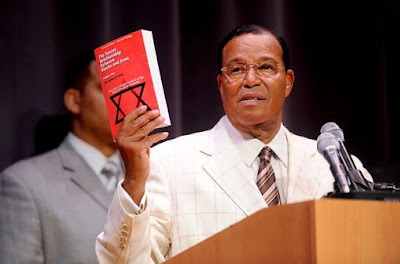 |
| Farrakhan and Trump: bigots of different feathers stick together. |
Trump Continues to Rack Up Endorsements from Nazis, Klan, Other Hate Groups. For the record, Donald Trump has also been endorsed by hate groups that include the Council of Conservative Citizens, the American Freedom Party, Occidental Dissent, the National Policy Institute, and the American Nazi Party, among others. Nor is this support merely abstract. At a Trump rally in Louisville, Kentucky, during the March 1st “Super Tuesday” primaries, African-American protestors, some from the Black Lives Matter (B.L.M.) movement, were shoved and insulted by members of the white-nationalist component of the crowd. The offenders included Matthew Heimbach, founder of the neo-Nazi Traditionalist Worker Party and a training director for the white-supremacist League of the South. Heimbach later said, “The entire point of the B.L.M.’s tactics is to push people until they push back. They’ve actually convinced themselves that these rank-and-file Trump supporters and even Trump himself are synonymous with the Klan, or at least with outright nationalists like myself.”
 |
| White supremacist Matthew Heimbach, a self-appointed crowd-control specialist at Trump hate rallies, is also, not surprisingly, a Vladimir Putin fan. |
Activist Says Sanders, Trump Candidacies Stoking Interest in Vermont Independence. A founder of the Second Vermont Republic (S.V.R.) independence movement said this month that his cause has been buoyed by this unusual presidential primary season—not only because the maverick socialist Bernie Sanders, a Vermonter himself, is using the rhetoric of grass-roots progressive rebellion, but because many liberal northeasterns, among many others, are wondering whether continuing to be part of the United States will be such a good idea if Donald Trump becomes president. “I think Bernie Sanders and Donald Trump are reinvigorating the conversation about Vermont independence in some pretty interesting ways,” Williams said. “There’s a real, I think, fear right now that the United States is moving in directions that we don’t want to participate in,” Williams said, noting that George W. Bush’s presidence was also a period of high interest in Vermont secession, but “the election of Barack Obama”—who is highly popular in the state—“in 2008 really sucked the oxygen out of the room.” Williams split with the economist Thomas Naylor, another co-founder of S.V.R., over Naylor’s cosying up to unsavory fellow separatists like the racist League of the South hate group.
“Moorish National” Squatter Convicted, Sentenced in North Carolina. A self-identified member of a “Moorish National American Government” was convicted of trespassing on March 1st in Charlotte, North Carolina, for illegally squatting in a large vacant foreclosed house for three months last summer and fall. The defendant, Ninti El Bey, got 45 days in jail, which can be waived if she chooses probation and community service. She and perhaps as many as eight fellow “Moorish” squatters were repeatedly evicted and El Bey was arrested twice and threatened police. Though a bank owns the house, she told authorities it was owned by an “International Indigenous Trust,” though the name she gave in connection with the trust was that of a Hungarian pornography star. El Bey says she will appeal the decision. Meanwhile, Brother D. A. Siggers-Bey, a Moorish Science Temple of America grand mufti told media that El Bey’s squatting is against Moorish teachings and went on to doubt that she is a true member of the nation. The “Moorish Science Temple” movement and its splinter groups believe that Black Africans are the true indigenous people of the Americas.
 |
| Moor in the dock: Ninti El Bey |
Manifesto by “Washitaw Moorish” Squatters Cites Atlantis, “Louisiana Republic.” In New Orleans, the Times-Picayune has released to the public the legal manifesto of sorts wielded by four squatters from the Moorish Science Temple movement’s “Moorish Washitaw” splinter group who were last month (as reported at the time in this blog) expelled from a house they had illegally taken over in New Orleans and now face felony burglary charges. On the letterhead of “the Mu’ur National Republic, Mu’ur Divine and National Movement of the World: Mu’ur Americans, Aboriginal and Indigenous Natural Peoples of Northwest Amexem, Northwest Africa/North America/‘The North Gate,’” in “New Orleans, Louisiana Republic,” the wildly inventive and profoundly juridically incoherent legal document bombards the reader with realistic-looking legal jargon but then veers sharply into talk of the Pharaohs of Egypt, the sunken continent of Atlantis, and the Lost Tribes of Israel. The group’s links to the “sovereign citizen” movement become apparent in references to one of the plaintiffs’ calling herself Yanamaria Latasha Bey, being a member of “her sovereign tribe, Washitaw de Dugdahmoundyah, Mu’ur (Mu’ur), which is a native tribe of the Republic of the united [sic] States of America, in which, the Washitaw enjoy Diversity of Citizenship Jurisdiction. Because they are a nation within a nation.” The referred-to Republic of (or, sometimes, “for”) the united (yes, in lowercase) States of America (RuSA) is a sovereign-citizens concept which holds that the current federal government is a non-sovereign corporation and that a dormant sovereignty rests in the states, ready to be revived by vigilantes running police, courts, and other government services. Ironically, many RuSA “organic constitutionalists” believe that African-Americans are not citizens because their emancipation was secured only through an amendment to the constitution, not through the main text and thus they are citizens only of the (non-existent) federal government, not of the truly-sovereign states. The document also cites President Dwight D. Eisenhower’s recognition of the newly independent Kingdom of Morocco in 1956 and an “International Proclamation” that Bey and another “Free Mu’ur National,” one Yahmel Yaffu Ali Bey, sent to President Barack Obama in 2011—all of this in a lengthy attempt to prove their right to occupy the house (which they did not, in fact, own).
| A map from the Washitaw Moorish website. |
Curaçao Police Question Separatist Party Leader over Predecessor’s Assassination. The head of Curaçao’s main pro-independence party, Pueblo Soberano (P.S.), was questioned by police on March 4th in connection with the 2013 assassination of Helmin Magno Wiels, who was at the time P.S.’s chairman. Jaime Córdoba said after his questioning that he had been interviewed only as a witness, not a suspect, and that he believes that the island’s National Investigation Team (N.I.T.) was on the right track in its investigation. Later, he lambasted the press for its insinuations about the police’s interest in him, and he stated, “I know who committed this act” (referring to the assassination); “in the coming month, everything will be revealed.” He added, “It’s an abuse what has been done to this country by killing and assassinating a man for speaking the truth. Now they think the party will fall—never. Voters will return.” P.S.’s goal is to secure complete independence from the Kingdom of the Netherlands, of which Curaçao is currently a “constituent country.”
 |
| Helmo Magno Wiels’s assassination in 2013 is still under investigation. |
Argentine Governor Delivers Falkland Isles Soil to Pope Francis. A delegation from the government of Argentina, including President Mauricio Macri, that visited Vatican City on February 28th presentedPope Francis with soil from the Falkland Islands. Rosana Bertone, governor of Argentina’s Tierra del Fuego province, said on March 2nd, after the visit, “Francis received all the letters sent from my constituency and also soil and pebbles from the Malvinas Islands, which were delivered by our marathon runner Daniela Brada.” Tierra del Fuego province includes not only the eponymous archipelago at Cape Horn but—symbolically—the British-ruled territories of the Falkland (“Malvinas”) and South Georgia islands, and Argentina’s vast, and internationally unrecognized Antarctic claim, stretching all the way to the South Pole. Francis has said repeatedly that he believes that the Falklands belong Argentina—which has never had a permanent settlement there—based on an 1820 claim by a naval mercenary from Connecticut in the name of the United Provinces of the Rio de la Plata. His Holiness also believes that virgins can get pregnant and that he has the power to turn wine into blood.
 |
| Argentina’s vast Tierra del Fuego province—on paper, at least. In reality, Argentina only governs the tiny little triangle of mainland at the upper left. |
Grand Duke of Flandrensis Names Cabinet, Including Anarctic Environment Portfolio. A micronation based in Belgium whose territorial claim consists of five islands off the coast of Antarctica named its cabinet this month, including ministers for multimedia, culture, and Antarctic affairs. Niels Vermeesch, who has been Grand Duke of Flandrensis since 2008, appointed the following ministers: Hein of Giddis, of Belgium, as Prime Minister for Internal Affairs and National Safety; Gwendolien de Loungville, of Belgium, as Minister of Finances and Economy; Jürgen of Bryggia, of Belgium, as Minister of Multimedia; George De Feyter, of France, as Minister of Antarctic Environment; Cezary Ostrowski, of Poland, as Secretary of Heraldry; Lander Hasaert, of Belgium, as Minister of Social Welfare and Integration; Gabriel Ritchie, of Scotland, as Minister of Media and Communication; Omar Cisneros, of the United States, as Secretary of Foreign Affairs for western Europe, Oceania, and the Americas; Bekhruzbek Ochilov, of Uzbekistan, as Secretary of Foreign Affairs for eastern Europe, Asia, and Africa; and Dieter Delmotte, of Belgium, as Minister of Culture.
The Grand Duchy of Flandrensis, which is committed to raising awareness of threats to the Antarctic ecology, and of environmental concerns generally, is believed to be the only national government that does not want any humans to visit or settle in its territory.
Thanks to Russ Grabczyk and Marko Puljic for alerting me to some of the news developments covered in this article.
[You can read in detail about these and many other sovereignty and independence movements both famous and obscure in my new book, a sort of encyclopedic atlas just published by Litwin Books under the title Let’s Split! A Complete Guide to Separatist Movements and Aspirant Nations, from Abkhazia to Zanzibar. The book, which contains 46 maps and 554 flags (or, more accurately, 554 flag images), is available for order now on Amazon. Meanwhile, please “like” the book (even if you haven’t read it yet) on Facebook and see this interview for more information on the book.]

